

20 Great MBA Application Essay Samples (With Links)
Want to ace your MBA application? A stellar essay can be your golden ticket.
With elite business schools like Harvard and Stanford boasting acceptance rates as low as 10% and 6% respectively, every aspect of your application counts. While GPA and GMAT scores matter, your essay can be a game-changer. Recognizing its weight, we’ve gathered top-notch MBA essay samples, endorsed by admission committees from premier institutions. Dive in and let’s craft that standout application!
What is an MBA Application Essay?
An MBA application essay is a detailed write-up about your personal and professional goals and aspirations. It also explains how the MBA program will help you attain your objectives for the future. Your essay is your one shot to convince the admission committee to consider you for the initial interview.

What Admission Committee Look for in an MBA Essay?
- Academic ability
- Impressive work experience
- Career Course
- Authenticity of goals
- Competencies, leadership , dedication, challenges, and growth
- The right reason for pursuing an MBA
- Your compatibility with the culture in which the program is being offered
If you want to learn more, here is the complete guide on how admission committees process MBA applications.
20 Great MBA Applications Essays Samples
Now you have known that what makes a great MBA admission essay, the next step is to write one for yourself. Before writing, check out this list of expert-vetted MBA application essays that secured admissions to top-rated business schools in the world. Admission consultants have shared these samples and they can be helpful if you read and analyze them carefully. If you’re completely unsure about how to get started, there are also custom essay writing services that can help you structure your essay with the help of professional editors.
Sample 1: Leadership-focused MBA application essay
This sample is particularly focused on leadership traits. If your essay is about explaining your leadership quality experience, this sample is right up your alley. The best thing about the essay is that it is written in a simple, engaging, and humorous style. It defines a great experience in a very conversational style.

Sample 2: Self-focused MBA application essay
If you are asked to write about your strengths, weaknesses, aims, and goals in your application essay, this sample will help you. The applicant who wrote this got accepted to the INSEAD business school. It doesn’t merely describe her strengths and weaknesses, but it presents a complete picture of herself as a person. It highlighted the events and incidents that shaped her personality.
Sample 3: Life-hardships-focused MBA application essay
If you want to explain your life’s hardships and the events that turned you into an ambitious person, this sample is for you. In this application essay, the candidate has defined three phases of his life and how he survived through each adversity. He beautifully explained why the MBA program is important to his future.
Sample 4: Continuous growth and learning-focused MBA application essay
This essay was submitted to Harvard Business School. The best thing about this piece is that the writer has explained her learning and professional development journey in a very sequential and engaging manner, which is truly admirable. A useful thing to remember about the MBA essays included in this list is that you can merge them into a single printable and perfectly formatted file with Sodapdf or another PDF editor. Having all of them stored in a single PDF is going to be quite helpful when it’s time to write your piece. But guess what? There are more examples to explore below, so let’s keep going…
Sample 5: Best MBA application essay for low scorers
Have a low GPA? What would you write about academics in an MBA essay to convince the admission committee? Do not overthink! MBA essay is not all about high achievements and sterling background. It is also an opportunity to atone for your past mistakes. This MBA essay was written by a student who obtained very low academic grades, yet got admitted to her desired business school. Her turning point? A powerful application essay.

Sample 6: A guitarist’s application essay for the MBA program
Suppose you are ambitious in a skill or profession that has nothing to do with the MBA program, yet you need the degree for certain reasons. How would you showcase that irrelevant skill in your MBA application essay? This sample essay will show how you how. A guitarist who got selected for the MBA program wrote this one. The applicant has intelligently defined his passion for guitar as a way of developing discipline, determination, leadership, and success. He explained how his passion affected his academics and how the guitar helped him cope with the challenges.
Sample 7: An engineer’s essay for MBA application
If you come from a technical or engineering background and have the ambition to pursue an MBA degree to boost your engineering career, this sample essay will help pave the way for you. This essay was submitted by a mechanical engineer to Harvard Business School. The writer explained how his engineering experience motivated him to pursue an MBA and how the program is important to his long-term goals.

Sample 8: Harvard Business School MBA essay
This essay was written by a candidate who got accepted to Harvard Business School. Check it out to know what the prestigious academic institution looks for in your essay.
Sample 9: Wharton Business School MBA essay
This essay has been honored as one of the best MBA essays ever received by the Wharton Business School in Pennsylvania. Check out the structure, organization, and flow, and adapt the same to your essay.
Sample 10: Columbia Business School MBA essay
The Columbia Business School’s admission committee shared this MBA essay. They explained why the applicant who wrote this was instantly accepted to the program and why they appreciated its content.
Sample 11: Stanford Graduate School of Business MBA essay
This essay was written by a candidate who got accepted to Stanford Business School for an MBA. If you are aiming to get your MBA at Stanford, this sample will give you a deep understanding of what convinces the esteemed school’s admission committee to accept applicants into their fold.
Sample 12: University of California Business School MBA essay
This sample was taken from a pool of successful MBA application essays submitted to the University of California business school. Read it carefully and analyze its structure, words, and substance before you compose your own fantastic MBA essay.

Sample 13: University of OXFORD business school MBA essay
If Oxford Business School is your target destiny for earning your MBA, then check out this outstanding application essay. The person who wrote it managed to grab the admission committee member’s attention.
Sample 14: London Business School MBA essay
This essay was written by a candidate who got accepted to the London Business School. The school’s admission consultant shared this sample as a reference to other MBA aspirants. This piece will specifically help you understand the tone, writing style, formatting, and overall flow of the MBA application essay that meets the school’s standards.
Sample 15: A goal-oriented MBA application essay
Sometimes the MBA admission portal may demand an essay specifically focused on your future goals. In such a case, you must be very sure about yourself and must convey your goals and future directions based on your experiences and planning. Check out this sample to get an idea of how a successful candidate writes about personal goals.
Sample 16: Executive MBA essay
This successful MBA application essay was submitted to the MIT Sloan Executive MBA Program. EMBA essay requires you to show strong potential, impact, leadership, and the ultimate need for the program. Read this essay if EMBA is on your horizon.

Sample 17: MBA video essay
Many business schools are turning to video-based essays for MBA applications. A video-based essay is a better option to express yourself directly to the admission committee. A successful candidate for the Kellogg School of Management submitted this sample. Listen to the video and appreciate how beautifully the applicant has explained his journey from beginning to end. Want to learn more about video MBA essays? Here is a complete guide.
Sample 18: Short-answer-based MBA application essay
Some business schools require candidates to respond to short questions to get insights into their personalities and suitability for the MBA program. More or less, most of the questions revolve around the same theme. The key to success is to grasp the intention of the admission committee behind the questions and to stick to your identity . These successful answers submitted to the Tepper School of Business will help you in formulating your answers.
Sample 19: MIT Sloan School of Management
This essay was submitted by a successful candidate for the MIT Sloan School of Management MBA program. See how this applicant smartly answered the essay questions.
Sample 20: Michigan Ross School of Business MBA program
The Michigan Ross Business School asks a diverse range of questions from candidates to analyze their competencies from multiple perspectives. If Michigan Ross is where you intend to get your MBA, this essay submitted by a candidate who got admitted to the school’s MBA program will help keep you on track.
What Should be Included in the MBA Application Essay?
- Your background: What shaped you into what you are now? Including ethnicity, obstacles, and struggles.
- Self-reflection: Your values, characteristics, strengths, and weaknesses.
- Your goals : How do you envision your future?
- Aspirations: Why MBA is important to you and how this program will help you in shaping your future?
- Justification: If you have low academic grades, explain the reasons you did not do well and what you learned from it.
- Experience and achievements: What have you achieved so far?
These are the significant components of an MBA essay. Just adjust the sequence, play with words, and come up with a persuasive yet realistic picture of yourself.

What Makes a Great MBA Application Essay?
- Be school-specific. Explain why you are passionate about the MBA program of the school to which you’re applying.
- Avoid edition. Write simply and engagingly. Let the reader read a meaningful story about you.
- Make it 100% typo-free. Grammatical errors and typos will ruin your essay. Apply standard essay format and structure guidelines , scan your piece several times for errors, get it reviewed by an expert, and present a very professional piece to the admission committee.
- Be original. Do not copy-paste from any source. Strictly follow plagiarism guidelines.
- Write an overwhelming introduction to urge the reader to keep reading and conclude your essay with a strong declaration.
- Be authentic. Write what you are, not what the committee wants to read.
- Be concise, as many schools impose a limit on the essay word count .
Do you want more tips? Here is a complete guide to writing a compelling MBA application essay.
The application essay is a core part of the admission process in the increasingly competitive MBA program. If you do not want to miss the chance of getting selected, you need to know what will make your essay stand out . The expert-vetted list of MBA application essay samples we cited here worked for the top business schools. Learn them by heart, and who knows, it may work for you too. Put your other activities aside, read and analyze the list carefully, and start writing your MBA essay to land in your dream business school.

Get your free PDF report: Download your guide to 80+ AI marketing tools and learn how to thrive as a marketer in the digital era.

Rafal Reyzer
Hey there, welcome to my blog! I'm a full-time entrepreneur building two companies, a digital marketer, and a content creator with 10+ years of experience. I started RafalReyzer.com to provide you with great tools and strategies you can use to become a proficient digital marketer and achieve freedom through online creativity. My site is a one-stop shop for digital marketers, and content enthusiasts who want to be independent, earn more money, and create beautiful things. Explore my journey here , and don't miss out on my AI Marketing Mastery online course.
This site uses various technologies, as described in our Privacy Policy, for personalization, measuring website use/performance, and targeted advertising, which may include storing and sharing information about your site visit with third parties. By continuing to use this website you consent to our Privacy Policy and Terms of Use .
20 must-read mba essay tips.

Business school admissions committees care about more than (just) your GMAT scores and GPA —they want to know who you are and why you belong in their program . Your MBA essays are your best chance to sell the person behind the résumé. They should tie all the pieces of your business school application together and create a comprehensive picture of who you are, what you've done, and what you bring to the table. Here's a roundup of our best MBA essay tips to keep in mind as you begin to write.
How to Write an Unforgettable B-School Essay
1. communicate that you are a proactive, can-do sort of person..
Business schools want leaders, not applicants content with following the herd.
2. Put yourself on ego-alert.
Stress what makes you unique, not what makes you number one.
3. Communicate specific reasons why you're great fit for each school.
Simply stating "I am the ideal candidate for your program" won't convince the admission committee to push you into the admit pile.
Read More: Find Your Business School
4. Bring passion to your writing.
Admissions officers want to know what excites you. And if you'll bring a similar enthusiasm to the classroom.
5. Break the mold.
Challenge perceptions with unexpected essays that say, "There's more to me than you think."
6. If you've taken an unorthodox path to business school, play it up.
Admissions officers appreciate risk-takers.
7. Talk about your gender, ethnicity, minority status or foreign background....
But only if it has affected your outlook or experiences.
8. Fill your essays with plenty of real-life examples.
Specific anecdotes and vivid details make a much greater impact than general claims and broad summaries.
9. Demonstrate a sense of humor or vulnerability.
You're a real person, and it's okay to show it!
BONUS: Don't Make These MBA Essay Mistakes
1. write about your high school glory days. .
Admissions committees don't care if you were editor of the yearbook or captain of the varsity team. They expect their candidates to have moved onto more current, professional achievements.
2. Submit essays that don't answer the questions.
An off-topic essay, or one that merely restates your résumé, will frustrate and bore the admissions committee. More importantly, it won't lead to any new insight about you.
Attend UNC's top-ranked online MBA program without putting your career on hold. See how.
3. Fill essays with industry jargon.
Construct your essays with only enough detail about your job to frame your story and make your point.
4. Reveal half-baked reasons for wanting the MBA.
Admissions officers favor applicants who have well-defined goals. However unsure you are about your future, it's critical that you demonstrate that you have a plan.
5. Exceed the recommended word limits.
This suggests you don't know how to follow directions, operate within constraints or organize your thoughts.
6. Submit an application full of typos and grammatical errors.
A sloppy application suggests a sloppy attitude.
7. Send one school an essay intended for another—or forget to change the school name when using the same essay for several applications.
Admissions committees are (understandably) insulted when they see another school's name or forms.
8. Make excuses.
If your undergraduate experience was one long party, be honest. Discuss how you've matured, both personally and professionally.
9. Be impersonal in the personal statement.
Many applicants avoid the personal like the plague. Instead of talking about how putting themselves through school lowered their GPA, they talk about the rising cost of tuition in America. Admissions officers want to know about YOU.
Read More: How to Ace Your MBA Interview
10. Make too many generalizations.
An essay full of generalizations is a giveaway that you don't have anything to say.
11. Write in a vacuum.
Make sure that each of your essays reinforce and build on the others to present a consistent and compelling representation of who you are, what you've done, and what you bring to the table.
Practice for the GMAT
Take a GMAT practice test with us under the same conditions as the real thing. You'll get a personalized score report highlighting your strengths and areas of improvement.
START A FREE PRACTICE TEST
- Business School

Find MBA Programs Matched to Your Interests
Explore our featured business schools to find those that are looking for students like you.
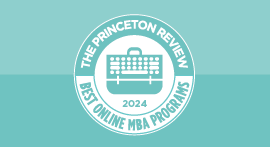
Top Online MBA Programs
On a mission to increase your salary? Our Top 50 Online MBA ranking is based on academics, career outcomes, tech platforms, and more.

Best Career Prospects
Find out which schools have the best track records for getting students jobs—and the highest starting salaries.
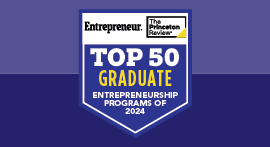
Top Schools for Entrepreneurship
Ready to build your own business from the ground up? Check out these 50 graduate programs.
Enrollment Advisor
1-800-2REVIEW (800-273-8439) ext. 1
1-877-LEARN-30
Mon-Fri 9AM-10PM ET
Sat-Sun 9AM-8PM ET
Student Support
1-800-2REVIEW (800-273-8439) ext. 2
Mon-Fri 9AM-9PM ET
Sat-Sun 8:30AM-5PM ET
Partnerships
- Teach or Tutor for Us
College Readiness
International
Advertising
Affiliate/Other
- Enrollment Terms & Conditions
- Accessibility
- Cigna Medical Transparency in Coverage
Register Book
Local Offices: Mon-Fri 9AM-6PM
- SAT Subject Tests
Academic Subjects
- Social Studies
Find the Right College
- College Rankings
- College Advice
- Applying to College
- Financial Aid
School & District Partnerships
- Professional Development
- Advice Articles
- Private Tutoring
- Mobile Apps
- International Offices
- Work for Us
- Affiliate Program
- Partner with Us
- Advertise with Us
- International Partnerships
- Our Guarantees
- Accessibility – Canada
Privacy Policy | CA Privacy Notice | Do Not Sell or Share My Personal Information | Your Opt-Out Rights | Terms of Use | Site Map
©2024 TPR Education IP Holdings, LLC. All Rights Reserved. The Princeton Review is not affiliated with Princeton University
TPR Education, LLC (doing business as “The Princeton Review”) is controlled by Primavera Holdings Limited, a firm owned by Chinese nationals with a principal place of business in Hong Kong, China.
- Resources ›
- For Students and Parents ›
- Business School ›
- MBA Programs & Rankings ›
How to Write and Format an MBA Essay
Create a strong essay for your MBA application
- MBA Programs & Rankings
- Business Degree Options
- Choosing A Business School
- Business School Admissions
- Business Careers and Internships
- Student Resources
- Homework Help
- Private School
- College Admissions
- College Life
- Graduate School
- Distance Learning
What Is an MBA Essay?
The term MBA essay is often used interchangeably with MBA application essay or MBA admissions essay. This type of essay is submitted as part of the MBA admissions process and is usually used to provide support for other application components like transcripts, recommendation letters, standardized test scores, and resumes.
Why You Need to Write an Essay
Admissions committees sort through a lot of applications in each round of the admissions process. Unfortunately, there are only so many places that can be filled in a single MBA class so a vast majority of the candidates who apply will be turned away. This is especially true of top MBA programs that receive thousands of applicants each school year.
Many of the applicants who apply to business school are qualified MBA candidates —they have the grades, the test scores, and the work experience needed to contribute to and succeed in an MBA program. Admissions committees need something beyond a GPA or test scores to differentiate applicants and determine who is a good fit for the program and who is not. This is where the MBA essay comes into play. Your MBA essay tells the admissions committee who you are and helps to set you apart from other applicants.
Why You Don't Need to Write an Essay
Not every business school requires an MBA essay as part of the admissions process. For some schools, the essay is optional or not required at all. If the business school does not request an essay, then you don’t need to write one. If the business school says the essay is optional, then you should DEFINITELY write one. Don't let the opportunity to differentiate yourself from other applicants pass you by.
MBA Essay Length
Some business schools put strict requirements on the length of MBA application essays. For example, they may ask applicants to write a one-page essay, a two-page essay, or a 1,000-word essay. If there is a desired word count for your essay, it is very important to adhere to it. If you are supposed to write a one-page essay, don't turn in a two-page essay or an essay that is only a half-page long. Follow instructions.
If there is not a stated word count or page count requirement, you have a little more flexibility when it comes to length, but you should still limit the length of your essay. Short essays are typically better than a long essay. Aim for a short, five-paragraph essay . If you can't say everything you want to say in a short essay, you should at least stay below three pages. Remember, admissions committees read thousands of essays - they don't have time to read memoirs. A short essay demonstrates that you can express yourself clearly and concisely.
Basic Formatting Tips
There are some basic formatting tips that you should follow for every MBA essay. For example, it is important to set the margins so that you have some white space around the text. A one-inch margin on each side and on the top and bottom is typically good practice. Using a font that is easy to read is also important. Obviously, a silly font like Comic Sans should be avoided. Fonts like Times New Roman or Georgia are typically easy to read, but some of the letters so have funny tails and embellishments that are unnecessary. A no-frills font like Arial or Calibri is usually your best option.
Formatting a Five Paragraph Essay
Many essays - whether they are application essays or not - utilize a five-paragraph format. This means that the content of the essay is split into five separate paragraphs:
- One introductory paragraph
- Three body paragraphs
- One concluding paragraph
Each paragraph should be about three to seven sentences long. If possible try to create a uniform size for the paragraphs. For example, you don't want to start with a three-sentence introductory paragraph and then follow up with an eight-sentence paragraph, a two sentence paragraph and then a four-sentence paragraph. It is also important to use strong transition words that help the reader move from sentence to sentence and paragraph to paragraph. Cohesion is key if you want to write a strong, clear essay.
The introductory paragraph should start with a hook - something that captures the reader's interest. Think about the books you like to read. How do they start? What grabbed you on the first page? Your essay isn't fiction, but the same principle applies here. Your introductory paragraph should also feature some sort of thesis statement , so the topic of your essay is clear.
The body paragraphs should contain details, facts, and evidence that support the theme or thesis statement introduced in the first paragraph. These paragraphs are important because they make up the meat of your essay. Don't skimp on information but be judicious - make every sentence, and even every word, count. If you write something that doesn't support that main theme or point of your essay, take it out.
The concluding paragraph of your MBA essay should be just that - a conclusion. Wrap up what you are saying and reiterate your main points. Do not present new evidence or points in this section.
Printing and Emailing Your Essay
If you are printing out your essay and submitting it as part of a paper-based application, you should print the essay out on plain white paper. Do not use colored paper, patterned paper, etc. You should also avoid colored ink, glitter, or any other embellishments designed to make your essay stand out.
If you are emailing your essay, follow all of the instructions. If the business school requested it to be emailed with other application components, you should do that. Do not email the essay separately unless you are instructed to do so - it could get in someone's inbox. Finally, be sure to use the correct file format. For example, if the business school requested a DOC, that is what you should send.
- MBA Essay Tips
- Sample MBA Essay for Wharton
- Chicago Booth MBA Programs and Admissions
- What Is the Average Cost of an MBA Degree?
- MS Degrees vs. MBA Degrees
- MIT Sloan Programs and Admissions
- Understanding the MBA Degree
- MBA in Management
- Why Business Students Get an Executive MBA
- Weekend MBA Programs
- An Overview of the M7 Business Schools
- The 10 Best Business Schools in Texas
- Why Get an MBA?
- Do You Make a Good MBA Candidate?
- The 10 Best U.S. Business Schools
- Top Ranked California Business Schools
How to Write a Powerful MBA Essay—With Examples
The MBA essay is critical to your business school application. Read our guide to writing the perfect MBA essay, with successful admit examples.
Posted November 7, 2024

Featuring Matt P.
Take Your MBA Resume From Good to Great!
Starting friday, december 13.
1:00 AM UTC · 45 minutes
Table of Contents
What is the mba essay.
The MBA admissions essay.
Those words alone are enough to make most MBA candidates run screaming. Writing in general is hard enough. Writing about why you want an MBA? Your short-term goals and career aspirations? What matters to you most, and why? Forget it.
Of course, you still have to write these essays.
The MBA essay is perhaps the most important part of the business school application. Every other part of the application — your GPA, your test scores, your letters of recommendation — is quantified, cut and dried, or out of your control. The essay is your chance to show up as a fully realized MBA candidate, with hopes, dreams, and vulnerabilities. Admissions officers are not simply assessing your candidacy as a future leader, they're looking to admit human beings.
That's where the MBA applicant essays come in.
That being the case, rather than being intimidated by it, treat the MBA essay writing process like the opportunity that it is: the chance for you to highlight your unique, iridescent self. It is the only moment in the MBA admissions process (prior to the interview) when you can speak directly to admissions officers and a time when you can show them who you really are. It's not easy to write something that will do that, of course, but with the tips and tricks in this guide, and some help from world-class MBA admissions consultants, we know you can do it. Give the essay the time, attention, and respect it deserves, and you'll be on your way to an offer of admission at your dream school.
Without further ado, let's dive in!

Ultimate MBA Essay Guide
See the MBA essay prompts, top tips from experts, and real examples from admits with this comprehensive guide.
How Long Will My MBA Essay Take?
First things first: let's talk about timing.
The MBA application is a behemoth; between exams, resumes, gathering your official transcripts, letters of recommendation, and the applications themselves, there's a lot to juggle. That being the case, we suggest you give yourself ample time to draft, write, and revise your essays. The last thing you want is to be rushed to the finish line.
So, give yourself at least three months to write your MBA admission essays. That should allow you enough time to draft, write, and edit. For more information on timing your entire business school application, click here for A Comprehensive MBA Application Timeline--With Chart .
Now, on to the critical question:
Free trial!

From 178 top coaches
Access a library of videos, templates, and examples curated by Leland’s top coaches.
Example essays.

Example Resumes

Application Prep

Video Courses

What Makes a Great MBA Essay?
At the highest level, the answer is the one that is truest to you. The whole point of an MBA application essay is to shine through as an authentic, vibrant human being, so the best essays are the ones that cut through the clutter, and allow you to do that.
Which begs the question — how do you cut through the clutter and shine through as a vibrant human being? Here are four critical tips to follow as you begin thinking about your MBA admission essays.
1. Answer the Question
This one sounds obvious, but you'd be surprised how many applicants launch into their story, get carried away, and forget to answer the question. Follow the prompt, and answer the essay question the admissions committee has asked you. Those prompts can actually be very useful when writing MBA essays — it's a great deal harder to write when you have no guidance or guardrails. With these essays, you have a very specific question you need to answer. So answer it!
2. Be Specific
Another mistake some business school applicants make is to stay at a high level in their essays, keeping their writing abstract and therefore inaccessible to the committee. If at any point, an admissions officer could replace your name with the name of another applicant, then your essay isn't getting deep enough. It's not enough, for instance, to say that you suffered adversity in high school, or that you really, really want a Wharton MBA. You need to explain, in detail, the adversity you faced, and give concrete and unique reasons why you think Wharton is the right program for you. The best essays offer hyper-specific examples and anecdotes, with details and anecdotes that no other candidate could bring to the table.To get those anecdotes, we recommend using the STAR template, as explained below:
- Situation: What was the situation you were facing? Where were you? How old were you? If you were in a professional role during this anecdote, what was the role, and how long had you been in it? If you were volunteering, at what organization? How long had you been volunteering there? Why did you start? Offer all the relevant information that the admissions readers will need to understand your story.
- Task: What was the task at hand? What went wrong? In your professional role, what was the challenge you faced? In that volunteering experience, what were the hurdles you had to overcome? You can't have a good story without conflict or tension, so after you set up the anecdote, explain what that conflict or tension was (and remember, be specific!).
- Action: What was the action you took to resolve the problem? What did you have to do to fix that issue at work? How did you clear that hurdle in your volunteer experience? Again, be specific about how you came through on the other side of that conflict/tension — and while you're doing it, highlight your leadership capabilities as much as possible! Remember that top programs are looking for future leaders who can assess a situation and decisively take action. (We'll say a bit more about this below, in the Personal Statement section.
- Result: What was the result of your action? If you were facing a growth problem at work, were you able to increase sales? If so, by what percentage? If you were advocating for diversity and inclusion at your local charity, what new programs did you implement to help with that effort, and what was the enrollment like in those new programs? Detail what happened in your anecdote with as much specificity as possible — and quantify, quantify, quantify!
If you want to learn more about how to master the STAR Method, read our article How to Nail “Tell Me About a Time…” Interview Questions .
3. Get Vulnerable
Most business schools’ prompts are written with the goal of getting to know as much about you as possible in the shortest number of words. To do that, you're going to have to share real things from your life — get personal, intimate, and vulnerable. Do not shy away from this. If you're starting to get emotional during the reflection, drafting, and writing process, good — that means you're on the right track. Keep going. (Of course, there is such a thing as too personal. When in doubt, ask an expert .)
Expert Tip: If it’s making you cry, it will make them cry.
Another good rule of thumb is to put something real and true on the table. Admissions committees have to read thousands of applications from thoroughly qualified individuals, some of whom might come from similar roles to yours, with letters of recommendation from equally impressive supervisors. To write successful essays and cut through that noise, you'll have to share something honest.
If you're doing it right, this can feel risky. At some point, you’ll likely think to yourself: “Can I say that?” The answer is: “Yes.” Of course, there is a line, you don’t want to be crass or offensive but always err on the side of being open and authentic.
The very worst thing you can do is be overly cautious and write something you think will please the admissions committee. These poor people have to read thousands of essays. If yours is just like everyone else’s, they’ll fall asleep. Don’t let that happen. Wake them up by putting yourself—your true, bright, vibrant, quirky self—on the page.
4. Don't Exaggerate
Finally, do not exaggerate, over-inflate, or lie. This goes without saying, but admissions committees are looking for honest candidates. The surest way to get rejected is to lie about something. (Business schools do a background check on you before you're properly admitted, so they will find out.) Don't be the person who over-inflates on their essays and then has their offer letter rescinded.
The Types of MBA Essays
All right — since we've covered high-level approaches to the MBA essays, it's time to dig into the various types. There are three general categories of MBA admission essays you'll see across the board.
1. Personal Statement
These questions ask you to offer up something sincere about yourself. Personal statements often touch on such things as your values and your character. In these, you'll want to be as authentic as possible, while also highlighting attributes like leadership, intellectual vitality, and teamwork that top business schools are looking for. The key to writing great personal statements is introspection – who are you, what do you want to be in this world, and why should they care?
Here are a few examples of previous personal statement essays:
- What matters most to you, and why? (Stanford GSB)
- Kellogg leaders are primed to tackle challenges everywhere, from the boardroom to their neighborhoods. Describe a specific professional experience where you had to make a difficult decision. Reflecting on this experience, identify the values that guided your decision-making process and how it impacted your leadership style. (Northwestern Kellogg)
2. Why an MBA/Why This School
In these, schools first want to hear about how an MBA will fit into your career, both short and long term. Top programs are looking for candidates who will: first of all, be gainfully employed upon graduating; second, have an illustrious career that will make their institution look good and encourage future generations of applicants to apply; and third, be consistent and generous donors. That being the case, they want to know about your career trajectory, and how an MBA will fit into it.
Expert Tip: Here, you want to be ambitious and inspiring in laying out your future career, but not naïve. Walk the line between shooting for the stars and sounding dreamlike and uninformed. There should be evidence for your goals in your past experiences; in other words, your past should be setting you up for success for your future. If your future aspirations are completely unrelated to anything you’ve done before, it’s less likely that you will accomplish them.
In this set of questions, you'll also encounter questions geared at figuring out why you would want to attend a specific school. MBA programs want to know that you're serious about attending their school — yield, or the percentage of admitted candidates who accept their offers of admission, is an important metric for them — but they also want to envision how you'll contribute to their admitted class. What will you uniquely bring to the table, the things that you'll do that the other candidates wouldn’t be able to offer?
We've heard former deans of business schools say that, in choosing a class, they're curating a world-class dinner party, and that each person invited to the dinner party has to bring something different. What will you bring to the dinner party?
Expert Tip: To demonstrate that you've done your research, and to help the committee envision you in their program, get specific in the ways that you’ll make the most of the MBA program. For example, which classes will you take when earning your MBA and why? What professors are you excited to learn from? What are some clubs, events, or organizations that you’re interested in getting involved in (or starting!)? The point here is to show that the school will be better off with you.
Here are a few examples of "why MBA / why this school" essays we've seen before:
- We believe Columbia Business School is a special place with a collaborative learning environment in which students feel a sense of belonging, agency, and partnership–academically, culturally, and professionally. How would you co-create your optimal MBA experience at CBS? Please be specific. (Columbia Business School)
- What do you hope to gain professionally from the Wharton MBA? (Wharton)
- Why Stanford? Describe your aspirations and how your Stanford GSB experience will help you realize them. (Stanford GSB)
- How will a Booth MBA help you achieve your immediate and long-term post-MBA career goals? (Chicago Booth)
See: How to Answer the "Why an MBA?" Essay Question
3. Behavioral/Other
Finally, most other essays will be behavioral in the sense that they’ll ask you about experiences, traits, strengths, weaknesses, and personal/professional achievements. There's a wide variety of topics here, but all the guidelines from above apply, with the final note to always prioritize authenticity (as mentioned in the Personal Statement section) and leadership ability (remember, business schools are choosing future leaders).
Here are a few examples of behavioral/other essays from the past:
- Describe the biggest commitment you have ever made. (Yale SOM)
- Please reflect on how your experiences have influenced your career choices and aspirations and the impact you will have on the businesses, organizations, and communities you plan to serve. (Harvard Business School)
- Think about times you’ve created a positive impact, whether in professional, extracurricular, academic, or other settings. What was your impact? What made it significant to you or to others? (Stanford GSB)
Top MBA Program Essay Prompts (Updated 2024)
To help you get started, we've compiled the required prompts from a few top MBA programs below:
Harvard Business School (HBS)
- Business-Minded Essay: Please reflect on how your experiences have influenced your career choices and aspirations and the impact you will have on the businesses, organizations, and communities you plan to serve. (300 words)
- Leadership-Focused Essay: What experiences have shaped who you are, how you invest in others, and what kind of leader you want to become? (250 words)
- Growth-Oriented Essay: Curiosity can be seen in many ways. Please share an example of how you have demonstrated curiosity and how that has influenced your growth. (250 words)
For more information, visit A Guide to the HBS Essay .
HBS’ essays are new for the 2024-2025 cycle. Use these two resources to make sure you’re fully prepared to write great essays: Harvard Business School New MBA Essay Prompts (2024-2025) and The NEW HBS Essays: Why They Changed & How to Answer Them .
Stanford Graduate School of Business
- What matters to you most, and why? (650 words)
- Why Stanford? (400 words)
Read these resources on the GSB essays from expert admissions consultants:
- Craft a Powerful Essay for Stanford GSB: What Matters Most & Why?
- 3 Things You Need for Successful Stanford MBA Essays | Leland
- Stanford GSB MBA Essays: Prompts, Tips, & Examples | Leland
University of Pennsylvania Wharton
- How do you plan to use the Wharton MBA program to help you achieve your future professional goals? You might consider your past experience, short and long-term goals, and resources available at Wharton. (500 words)
- Taking into consideration your background – personal, professional, and/or academic – how do you plan to make specific, meaningful contributions to the Wharton community? (400 words)
For Wharton-specific advice, visit A Guide to the Wharton Essays .
Columbia Business School
- Essay 1: Through your resume and recommendation, we have a clear sense of your professional path to date. What are your career goals over the next three to five years and what, in your imagination, would be your long-term dream job? (500 words)
- Essay 2: The Phillips Pathway for Inclusive Leadership (PPIL) is a co-curricular program designed to provide students with the skills and strategies needed to develop as inclusive leaders. Through various resources and programming, students explore and reflect on the following five inclusive leadership skills: Mitigating Bias and Prejudice; Managing Intercultural Dialogue; Addressing Systemic Inequity; Understanding Identity and Perspective Taking; and Creating an Inclusive Environment. Describe a time or situation when you had the need to utilize one of these five skills, and tell us the actions you took and the outcome. (250 words)
- Essay 3: We believe Columbia Business School is a special place with a collaborative learning environment in which students feel a sense of belonging, agency, and partnership--academically, culturally, and professionally. How would you co-create your optimal MBA experience at CBS? Please be specific. (250 words)
If you’re looking for more tips on the CBS essays, read our Guide to the Columbia Business School Essays .
Chicago Booth
- How will a Booth MBA help you achieve your immediate and long-term post-MBA career goals? (250-word minimum)
- An MBA is as much about personal growth as it is about professional development. In addition to sharing your experience and goals in terms of career, we’d like to learn more about you outside of the office. Use this opportunity to tell us something about who you are… (250-word minimum)
*Pro tip: Some essay questions such as these will say “no maximum.” While it’s certainly a good thing that you’re allowed to write more, keep in mind to never write too much. Our rule of thumb for things like this is to never go over 200 words past the “minimum” count.
Read more at A Guide to the Booth Essays .
Northwestern Kellogg
- Intentionality is a key aspect of what makes our graduates successful Kellogg leaders. Help us understand your journey by articulating your motivations for pursuing an MBA, the specific goals you aim to achieve, and why you believe now is the right moment. Moreover, share why you feel Kellogg is best suited to serve as a catalyst for your career aspirations and what you will contribute to our community of lifelong learners during your time here. (450 words)
- Kellogg leaders are primed to tackle challenges everywhere, from the boardroom to their neighborhoods. Describe a specific professional experience where you had to make a difficult decision. Reflecting on this experience, identify the values that guided your decision-making process and how it impacted your leadership style. (450 words)
For more on Kellogg’s essays, read How to Nail Your Kellogg MBA Application Essays .
MIT Sloan doesn’t use traditional essay prompts; instead, applicants are required to submit a cover letter, video, and short answer questions, as well as the other traditional application materials.
Cover Letter
MIT Sloan seeks students whose personal characteristics demonstrate that they will make the most of the incredible opportunities at MIT, both academic and non-academic. We are on a quest to find those whose presence will enhance the experience of other students. We seek thoughtful leaders with exceptional intellectual abilities and the drive and determination to put their stamp on the world. We welcome people who are independent, authentic, and fearlessly creative — true doers. We want people who can redefine solutions to conventional problems, and strive to preempt unconventional dilemmas with cutting-edge ideas. We demand integrity, respect, and passion.
Taking the above into consideration, please submit a cover letter seeking a place in the MIT Sloan MBA program. Your letter should conform to standard business correspondence, include one or more professional examples that illustrate why you meet the desired criteria above, and be addressed to the Admissions Committee (300 words or fewer, excluding address and salutation)
Video Question 1
Introduce yourself to your future classmates. Here’s your chance to put a face with a name, let your personality shine through, be conversational, be yourself. We can’t wait to meet you!
Videos should adhere to the following guidelines:
- No more than 1 minute (60 second) in length
- Single take (no editing)
- Speaking directly to the camera
- Do not include background music or subtitles
Note: While we ask you to introduce yourself to your future classmates in this video, the video will not be shared beyond the admissions committee and is for use in the application process only.
Video Question 2
All MBA applicants will be prompted to respond to a randomly generated, open-ended question. The question is designed to help us get to know you better; to see how you express yourself and to assess fit with the MIT Sloan culture. It does not require prior preparation.
Video Essay 2 is part of your required application materials and will appear as a page within the application, once the other parts of your application are completed. Applicants are given 5 seconds to prepare for a 60-second response.
Short Answer Question
How has the world you come from shaped who you are today? For example, your family, culture, community, all help to shape aspects of your life experiences and perspective. Please use this opportunity to share more about your background. (250 words)
For top-notch advice on the MIT Sloan question prompts, read our articles Expert Guide to the MIT Sloan Short Answer Question and MIT Sloan Video Statement: Overview, Advice, & Common Mistakes .
How to Start Writing Your MBA Essay
So you've read about the types of essays, and seen some of the prompts from top MBA programs. Now it's time to actually start diving into the essay.
The very first thing to do, before putting pen to paper, is to look inward . Why do you want an MBA? What role will this degree play in your professional growth? How do you imagine it will shape your life? What do you want out of your career? What is the most important thing in the world to you?
Yes, these are life’s deep-end questions, but you’ll need to tackle them in these essays, so before you start all of your writing, take the time to think through them. Go for a run, swim some laps, bake a cake – however you get into the flow – and start a dialogue with yourself. Put down your work, turn your phone off, and give your mind permission to go to the places it usually avoids. That’s a good place to start. That’s where the answers are.
Expert Tip: The first sentence is the hardest one to write. When you're starting out, it can be intimidating and anxiety-producing. The trick is to simply put anything down – and don't look back. Keep putting one sentence after the other. You can edit later: let whatever comes to you out onto the page. If you’re struggling with self-critique, dim your computer screen until you can’t even see the words you’re typing. Then keep going. You may also prefer to go on a walk and record yourself talking. Whatever your preferred method, just get started.
Additional Tips & Tricks
Once you've started your essay, it's a matter of persistence: keep writing, then keep drafting and editing until you have something you're really proud of.
To help you write a successful MBA essay, here are a few more tips and tricks:
Take Breaks
When you hit the wall — and you will hit the wall — stop and take a breather. This is your brain telling you it needs to do something else. Walk your dog. Take a lap around your room. Eat some cheese. Your body needs sleep every night to function; your mind is the same way. That next leap of inspiration will come exactly at the moment when you’re least expecting it.
Read it Out Loud
When you finally have a draft, print it and read it out loud to yourself. Your ear will catch things your eyes miss. Reading out loud is the best way to pick up on spelling errors, clunky transitions, and paragraphs that still need ironing out. It’s also a good way to envision how the admissions committee will experience your essay.
Don’t be precious with your essay. Send it to anyone willing to read it. Solicit as much feedback as you can. If you don’t like what people have to say, you don’t have to incorporate it, but you need an impartial third party to give notes on what they’re seeing, thinking, and feeling. (You’re too close to things to do it for yourself.) This is where a Leland coach comes very much in handy!
Complete Everything Early
This is more of a timing consideration, but you do not want to trip at the finish line because your internet went down the night before the deadline, or your credit card was denied when paying your application fee (it's happened before). Don't let that be you!
Here is another article to get you started, written by an expert essay coach: 7 MBA Essay Tips to Make You Stand Out in 2022 .
Example MBA Essays
Finally, here are two real-life examples of MBA essays to help inspire you. The first, a personal statement essay, was submitted by an admit to Berkeley Haas' Executive MBA program; the second, a career goals/why MBA essay, was submitted by an admit to Chicago Booth's deferred MBA program.
Haas Admit:
A person’s identity is shaped by many different aspects, including family, culture, personal interests, and surrounding environments. Please share a facet of your identity or story that is essential to who you are. (300 words) My upbringing in India, filled with countless myths and legends, had a profound influence on me. The most formative tale was about a sage who prays for years to the goddess of knowledge, but in vain. In the end, the goddess didn’t appear for the sage because he was turning his prayer beads the wrong way! As a child, this story upset me: the sage worked so hard and had the right intentions. As an adult, though, I’ve come to realize that the goddess of knowledge was right: you can’t succeed unless you do things the right way.
Seven years ago, two friends and I started a company, XXXX: a digital health platform that would allow patients to store medical records online and consult doctors remotely. We had early success—we brought on 2,000 patients at XXXX, a gynecology clinic in XXXX—but ultimately we didn’t have the resources to properly scale, and had to shut the company down. Among the many lessons I learned, the most valuable was that ideas and hard work are common; businesses succeed or fail based on execution—on doing things the right way. Two years ago, I relearned this lesson in the most painful way possible: when my marriage ended. My wife and I loved each other, but we weren’t there for each other when it mattered most. Our feelings weren’t enough—we had to back them up with the right actions.
It’s disheartening when you have good intentions but still fall short. When this happens, though, you have to keep trying—because eventually you will do things the right way. I carry the story of the sage with me always, not as a harsh lesson, but as a motivating goal: one that keeps me striving towards doing things the right way.
Booth Admit:
How will the Booth MBA help you achieve your immediate and long-term post-MBA career goals? (250 word minimum)
I want to start a geothermal company that will help lead the energy transition away from fossil fuels and toward renewable energy—by targeting existing oil wells as sites for geothermal plants. Oil fields are close to electric grids and have high nearby subsurface temperatures, making them ideal sites for geothermal plants. By building geothermal infrastructure nearby, my company will produce cleaner, cheaper energy, making it more profitable for operators to switch from oil to geothermal. As oil companies decommission their wells, I’ll negotiate for their land rights, so I can use their existing wells for new geothermal vents. I want my company to prove the case for economically viable, carbon-neutral energy production.
After getting an MBA, I want to start a geothermal company which will help me lead the energy transition away from fossil fuels to renewable energy. I plan to target developed oil fields in Texas, where, in many places, producing wells are flowing enough hot fluid to generate clean energy. Using this geothermal heat, the carbon footprint of oil and gas extraction will decrease as fewer fossil fuels are utilized to power surrounding infrastructure. As the wells approach their economic life, I will negotiate the lease from various operators, saving them millions in plug and abandonment costs, and retrofit the wells for direct geothermal energy production via closed-loop binary fluid systems, bringing emissions to zero. To accomplish this goal, I need to shore up my knowledge of energy economics and entrepreneurial finance, develop a strong sense of leadership, and build a network of like-minded individuals that will help me lead the transition and I believe I can get those things at Chicago Booth.
My immediate career goal is to develop my first co-production site in Shelby County, Texas at the Blanton well site, which produces abnormally heated fluid from the flanks of an active salt dome. Before investing in capital expenditures, developing a strong sense of energy economics and broader markets is necessary to verify financial feasibility. The University of Chicago, through the Graduate-Student-At-Large: Business program, is already allowing me to accomplish this goal with my enrollment in “Microeconomics” with Professor Andrew McClellan. His instruction helped me understand the impact taxes and subsidies have on market equilibrium, an important aspect of renewable energy as green energy tax incentives continue to change on a yearly basis. As my company continues to grow, having a strong finance and accounting foundation is imperative to building and sustaining a healthy company. Electives such as “Accounting for Entrepreneurship: From Start-Up through IPO” will provide the skills I need to be successful by following the life-cycle of a business that originates as a start-up and covers topics such as building an initial accounting infrastructure. I understand that the execution of the business is as important as developing the idea and proof of concept, and Booth is the best place for me to develop financial fluency.
Leading the energy transition will require a strong sense of leadership. Not only will I need to lead those I get to work with over my career, but to lead the energy transition, and reverse the impact fossil fuels have had thus far, I must have the emotional intelligence to inspire others to join me in my journey. The “Interpersonal Dynamics” course at Booth will allow me to develop my communication skills and better understand the emotions and perceptions of my colleagues. These skills, synthesized with leadership development acquired in “Leadership Practicum” will prepare me to act as a relational leader, who understands the needs of others. As a relational leader, I hope to foster an environment which promotes happiness and maximizes efficiency, not only to make our efforts in changing the world more successful, but to excite other people to join our cause.
To find the greatest chance of success in leading the energy transition, I will need a network of like-minded individuals who can provide a diversity of thought. Chicago Booth provides the opportunity to develop that network through different community experiences. The Energy Club’s “Energy Forward” conference, which designates time to topics in oil and gas and renewable energy will allow me to hear from industry leaders, build meaningful relationships with peers, and contribute my sector experience to the public forum as I learn from those around me. Opportunities through the Entrepreneurship and Venture Capital Group such as “SeedCon” will help me connect with successful entrepreneurs and early-stage investors whose ideas and funding might change the course of my venture’s trajectory. Even in the GSALB program, I have had the opportunity to connect with other students in various sectors, including the energy industry. I hope to continue to strengthen those connections and continue building new ones with matriculation into the full time program.
Connect with an Expert for all your MBA Essay Questions
We know that a lot goes into the process of MBA essay writing. Research, planning, and execution all are major stages that take a lot of time. If you’re looking to fast-track your essay writing process while still blowing away the admission committee, try looking at some of our all-star MBA admissions consultants . We have a wide array of experts ready to give you as much help with MBA essays as you need, just check out some of our top-rated coaches below!
FAQs for Writing Your MBA Essay
What is the most important aspect of an MBA essay that admissions committees are looking for?
- The most crucial aspect of an MBA essay is authenticity. Admissions committees want to see the real you, so be honest and genuine in your responses. Highlight your unique experiences, values, and aspirations to stand out.
How long should my MBA essay be?
- The length of your own essay will depend on the specific prompts and guidelines provided by each school. Generally, essays range from 500 to 1,000 words. Always adhere to the word limit specified in the prompt. In the event that there’s no limit, we recommend floating within 200-300 words of whatever posted word count there is.
Can I use the same essay for multiple MBA applications?
- You can use similar content, but it’s essential to edit each essay to be about the specific school and prompt. Schools are looking for personalized responses that demonstrate your understanding of their program and how it aligns with your goals. It’s also easier than you’d think for the admission committee to spot a copy-and-pasted essay.
How do I figure out what to write about?
- Select experiences that showcase your leadership, problem-solving skills, and personal growth. Focus on stories that highlight your unique qualities and align with the values and culture of the program you're applying to.
What should I avoid doing in my essay?
- Avoid clichés, generic statements, and exaggerations. Be specific and detailed in your responses. Also, steer clear of overly technical jargon that might be hard for the committee to understand unless it’s directly relevant to your story.
Who can I ask for feedback on my essay?
- Seeking feedback from trusted friends, family, or mentors can be very helpful. In addition, consider working with one of our admissions coaches who can provide professional insights and help refine your essay to make it a more compelling story.
What should I do if I don’t have a traditional business background?
- If you don’t have a traditional business background, focus on transferable skills and experiences that highlight your leadership, analytical abilities, and teamwork. Demonstrate how your unique perspective will contribute to the MBA program and your future career.
How do I handle multiple essay prompts for the same school?
- Approach each prompt separately and ensure that each essay provides new insights about you. Avoid repeating the same information across essays. Instead, use each essay to highlight different aspects of your experiences, skills, and aspirations.
Here are several other articles that you may find helpful as you put together your MBA application:
- The Most Frequently Asked Questions on MBA Applications
- My Top Piece of Advice for MBA Applicants
- How I Nailed My MBA Interview and Gained Admission to Top 10 Business Schools
- 4 Expert Tips on Paying for Business School
Browse hundreds of expert coaches
Leland coaches have helped thousands of people achieve their goals. A dedicated mentor can make all the difference.
Browse Related Articles

August 6, 2024
The Ultimate M7 MBA Essay Guide
Everything you need to know to write a killer essay for your M7 MBA application, including prompts, deadlines, expert advice, coach recommendations, additional free resources, and more.

January 28, 2024
How to Nail Your Stanford GSB Short Answer Questions
Learn how to stand out with your Stanford GSB short answer questions.

January 4, 2024
HBS 2+2 Deferred MBA Essay Prompts & Tips (2024)
As of 2024, HBS has changed its deferred MBA essay prompts away from the traditional, "What else should we know about you?" to three smaller essays. Read more and nail your HBS 2+2 application here.

January 31, 2024
How to Nail the "Why Wharton" MBA Essay
Learn how to craft a compelling 'Why Wharton' MBA essay that sets you apart from the competition. Elevate your application to stand out.

July 4, 2024
Duke Fuqua — MBA Program & Application Overview
Applying to Fuqua? Read this guide for the most practical strategies and tips curated by the best MBA admissions coaches in the world and Fuqua alumni to get you that much closer to your dream school.

June 27, 2024
A Guide to the Columbia Business School Essays (2024-2025)
Coach Melanie E. walks you through each Columbia Business School essay prompt for the 2023-2024 cycle, breaking down what adcoms are looking for and offering expert advice on how to nail your responses.

March 1, 2024
UNC Kenan-Flagler MBA Essays Guide: Overview, Tips & Examples
Get ready to ace your UNC Kenan-Flagler MBA application with this comprehensive essay guide.

March 2, 2024
Georgetown McDonough MBA Essays Guide: Overview, Tips & Examples
Looking to ace your Georgetown McDonough MBA essays? Our comprehensive guide provides an overview, valuable tips, and real examples to help you craft compelling and impactful essays that will set you apart from the competition.

UW Foster MBA Essays Guide: Overview, Tips & Examples
Learn everything you need to know about writing impactful UW Foster MBA essays with our comprehensive guide.

March 12, 2024
A Guide to the UC Berkeley Haas Accelerated Applicants Deferred MBA Program
Considering applying to Haas' Accelerated Applicants Deferred MBA Program? Look no further! In this guide, we delve into important information about the program, key deadlines, and tips for maximizing your application.

September 4, 2024
How to Answer "Tell Me About Yourself" in Consulting Interviews
Learn how to craft a compelling answer to the 'Tell me about yourself' question in consulting interviews with tips, examples, and expert advice.

January 9, 2024
How to Nail Your Kellogg MBA Application Essays
Tips and tricks that will help you craft the best application essays possible and get admitted into Kellogg.

How to Write an MBA Application Essay That Stands Out

Personal MBA Coach regularly publishes detailed tips on how to approach most of the top MBA application questions (download our e-book on how to approach the M7 essays ). Of course, our clients received details and customized advice through our comprehensive packages , but some key essay writing and editing basics hold true regardless of the essay question or school. To share these with you, our team, including former M7 admissions directors and Ivy-League-educated editors compiled this guide to successful MBA essay writing .
Effective MBA admissions essays can be different from any other type of prose. Knowing how to approach them can significantly boost your chances of MBA admissions success. Before going into specific MBA essay writing tips, let’s look at the most common types of MBA essays. Understanding the type of essay (and its ultimate purpose) will help you determine which personal and professional examples are most relevant, what tone you should choose, and how you can use the question to demonstrate your candidacy in the best light (and ultimately get into your dream school).
What are the Different Types of MBA Essays?
Goals essay.
The purpose of this type of MBA application essay is to discuss your post-MBA career goals and prove that you need an MBA to achieve them. In a goals essay, depending on the word limit, you may share some career highlights as well as your specific short-term and long-term goals. For instance, one of the Wharton MBA admissions essays invites MBA candidates to lay out their professional aspirations. When drafting this type of essay, make sure to be specific and focused. While no one expects you to commit to these goals post-MBA, you should demonstrate to the admissions committee that you have thought about your career goals and determined that an MBA is the ideal steppingstone on your path to achieve them.
Personal Story Essay
Varying in word count, this type of MBA application essay tends to be more personal. The main goal of a self-reflection essay is to get to know the real you. These essays can range from the 650-word, open-ended Stanford GSB application essay to the 100-word questions Michigan Ross asks. Personal MBA Coach’s expert tip here is to stay true to yourself and consider your Personal Story. Do not write what you think the admissions committee wants to read. Write about your passions, values, failures—nothing is off limits. At the same time, you want to keep a positive mindset. If you are discussing your failure or something tragic that happened to you, make sure to present it as a story of growth. This is not a creative-writing contest—remember that you are writing your MBA application essay, and the main goal of this essay should be to convince the admissions committee that you will add a unique perspective in the classroom and on campus.

Contribution Essay
Leadership Essay
While evidence of leadership should be included in many different essay types, some MBA essays directly ask candidates about their leadership experience. Kellogg ’s second MBA essay is a classic example of this: “ Kellogg leaders are primed to tackle challenges everywhere, from the boardroom to their neighborhoods. Describe a specific professional experience where you had to make a difficult decision. Reflecting on this experience, identify the values that guided your decision-making process and how it impacted your leadership style. ” While it is great to show how you have led your peers, do not forget about humility. It is expected that your leadership style is still a work in progress. In fact, in some leadership essays, you will want to tell the reader how you wish to fine-tune your leadership style during your MBA.
Video Essay
Video essays are becoming increasingly popular among business schools’ admissions committees. For instance, Berkeley Haas introduced a video essay this year. Other schools, including MIT Sloan , have required a video essay for many years. Some schools, such as Chicago Booth , require a video essay for applicants offered an interview. The video essay is a completely different format, and unlike all the essay types above, this is the one where you should not overedit. A few bullet points in preparation are great; however, writing out the whole script will make you appear less natural. Video essays are rather more personal, so you want to come across as approachable and show that you would be great to have in the classroom. Appearing too rigid and rehearsed will hinder your chances. Also, unless given directions otherwise, keep the style simple. Simply talking into the camera will look much more professional than a heavily edited video with lots of unnecessary special effects.

How to Approach the MBA Admissions Essay Writing Process?
Now, let’s talk about the basics of the essay writing process. We advise our candidates to follow a 5-step process as they develop their application essays, leaving adequate time for each stage.
1. Brainstorm
Brainstorm each essay question one at a time. Now that early decision deadlines have passed, you are free to begin with the essay that seems easiest or comes most naturally to you, as your writing will improve throughout the process. In developing potential topics, consider your relevant strengths, experiences, and accomplishments: Choose those that bring the most to the table.
Before you begin to develop prose, outline the key points you hope to cover in a sequence that flows logically. Pay special attention to the length you will allot to each section of the essay.
Once you have a solid outline, begin to put together your first draft. At this stage, it is ok if your writing is not perfect. Most first drafts will be a bit longer than the final product, but make sure you have the substantive points in place and that they flow together well.
4. Edit and Edit Again
Editing is the most time-consuming part of the essay writing process, particularly if you have written too much in the initial draft. Be critical of what needs to be there and what does not, and make sure you remove extraneous or superfluous material. Fine-tune your writing to make sure that the structure, verbs, and vocabulary all serve to make your thinking clear. Avoid repetition and be concise.
And finally, proofread. If you are not great at spelling or grammar or even generally at writing, ask someone who is good at those things to read your essay. A fresh set of eyes is priceless for catching mistakes. Personal MBA Coach uses proofreaders for each MBA application for this reason.

5 Tips for Writing a Successful MBA Admissions Essay
1) answer the essay question.
This seems like a no-brainer, but many candidates write beautiful essays that do not answer the essay question. Instead of writing what you want to show off, answer the question (or make sure that what you want to show off answers the question!). While we do advise thinking a bit outside of the box and considering the why behind an essay prompt ( what are they really trying to get at? ) first and foremost you must answer the question.
That is one reason recycling essay copy from one school to the other is often not a great idea: While it works sometimes for schools whose essay questions are nearly identical, most often it obscures the whole objective of answering the question. Good MBA essay editing should address this, refocusing the material. So, go through your copy and make sure the answer is in there. If you are using the essay you wrote for another school, make sure you tailor it to fit and answer the pertinent essay prompt.
2) Write Authentically
Do not write what you think admissions committee members want to read. There is no one perfect candidate profile. Instead, your uniqueness will be one of your greatest selling points. Your essays should paint a clear picture of who you are, what motivates you, and what you are passionate about—genuinely. Do not feel compelled to show how you fit the mold that seemingly makes up the “ideal” candidate. If you have no desire to run a non-profit, that is ok. If you are not motivated by improving the environment, do not pretend you are. Readers will see right through this, and you could end up doing more harm than good.
3) Look at the Application Comprehensively
Essays are just one part of the overall MBA application. In addition to submitting a resume (unsure how to write an MBA resume? Check out these tips ), you fill out a detailed application whose value you should use in every detail. Many schools require short essays and short answer questions and video essays as well. In addition, you have letters of recommendation . Those also should be used to your advantage to include material you may not have other opportunity or space to talk about. This means there are other places to list and highlight items such as extracurricular activities.
There is no need—or space—to try to fit this all into your essays: Focus on a few chosen facets of your passions or accomplishments to answer the essay questions and use other material in other places.

4) Keep Your Language and Writing Style Approachable
You should assume that terms you regularly discuss at the office—what is commonly referred to as industry jargon—are foreign to others, including admissions committee members, and they do not want to have to wade through it, trying to understand, as if it were a foreign language.
Harvard Business School has gone so far as to specifically ask candidates to not use jargon, both in the MBA application essay and the short answer questions. The best MBA essay editing will eliminate jargony language entirely and translate to readily understandable English, which helps convey what you are talking about and who you are. Particularly when it comes to showing off an accomplishment or how you added value in a business scenario, you want to make sure that technical language does not get in the way and impede your ability to clearly communicate what you did. On some occasions, it may be beneficial to ask a loved one to read your essay, though it is not always the best choice—check out this blog for a comprehensive breakdown of when it is a good idea to involve your friends and family in your MBA journey.
5) Limit Flowery Prose and Simplify Your Style
Similarly, we often read complex flowery prose. By flowery we mean prose that is overly ornate, rambling, and verbose. While showing off your writing style may be the point when applying to a writer’s program, when applying to business school you should write well but in a practical and straightforward manner. Most schools want direct, substantial, detailed answers to the questions—not rambling prose. You should write in a style that is accessible to everyone, from your grandmother to a professor of microfinance, should be able to understand your essays.
In sum, your essays should convey why you are someone others would want to study with, learn from, and eventually be inspired by. That type of person is human and down to earth. Your essays should show this.
Finally, be concise. Write to the word count. If you are having difficulty making a choice between two options, you can vet that choice, but once you have chosen your topic, during the outline process eliminate material that is not needed. It is very hard to cut 200 words from a 500-word essay and not change the overall intended impact and meaning. Trimming 30 words is one thing—though it is very time-consuming, it can be done artfully without losing much—but you cannot cut an essay in half and not lose substance that should be included.
Get Personalized MBA Essay Consulting With Personal MBA Coach
Not sure how to articulate your story through various types of essays? Personal MBA Coach is here to guide you through writing your best MBA application essays! Check out our Comprehensive Packages to see how we can help!

You also may like these other blog articles:

Find out why we are consistently ranked #1. Sign up for a 30-minute consultation today!
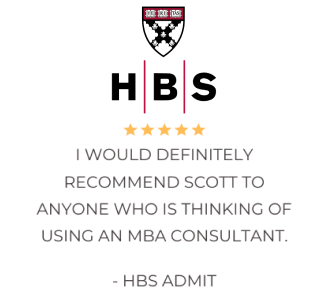
We have over 200 5 Star Reviews. Find out WHY!
schedule consultation
GMAT Prep Online Guides and Tips
7 tips for writing a winning mba application essay.
Nervous about your MBA admissions essay? You’re not alone! Many applicants wonder how to put their best foot forward in a business school entrance essay.
In this article, I’ll tell you what admissions committees look for in application essays and offer MBA essay tips on how to make yours stand out. We’ll also take a look at the different kinds of business school essays and a few examples of MBA essay prompts.
Why Do Business Schools Ask for Essays? What Do They Look For?
Business schools ask for essays for several reasons, all of which help admissions committees determine whether you have the skills and traits to succeed in an MBA program.
First, MBA admissions committees want to see how you write. Communication skills—including concision, clarity, style, and fluency in English—will be essential to your success in business school. One way of discerning your level of writing ability is to require an original writing sample. In an MBA essay, you have to get your point across straightforwardly, elegantly, and concisely; being able to do this is a key element of succeeding in business school and the world of business in general.
Also, MBA admissions committees want to get a sense of who you are on a more personal level. MBA application essays tell admissions officials about you not only through what you say, but in how you say it. Are you self-aware, for example, and can you reflect on past challenges or mistakes in a thoughtful way? Do you demonstrate insight into who you are and your goals? How you answer questions about yourself, your career, and your journey can help MBA admissions officials discern your level of critical thinking and personal insight.
Not sure how or what to study? Confused by how to improve your score in the shortest time possible? We've created the only Online GMAT Prep Program that identifies your strengths and weaknesses, customizes a study plan, coaches you through lessons and quizzes, and adapts your study plan as you improve.
We believe PrepScholar GMAT is the best GMAT prep program available , especially if you find it hard to organize your study schedule and don't want to spend a ton of money on the other companies' one-size-fits-all study plans.

You can have countless accomplishments, but to succeed in business school, you’ll also need to fit in with the campus climate, work well with your peers, and contribute to campus diversity in a meaningful way. The MBA essay is a place for you to talk about the background or experiences you have that are unique to you and that you believe could differentiate you from your colleagues and/or provide a fresh perspective to campus.
Finally, essays are a way for you to showcase the qualities that most MBA programs say they are looking for in applicants, such as leadership skills, community involvement, problem-solving skills, communication skills, clear goals, and a strong sense of ethics. Some of these traits might not be readily apparent from a resume alone, and an MBA essay can be a place for you to elaborate on how you’ve cultivated them in yourself.

MBA Entrance Essay Sample Prompts
Most MBA entrance essays ask you about one of several things. Many of them are variations on similar questions: the open-ended question, the leadership question, the personal growth question, questions on short- and long-term academic and career goals, and the diversity question. For each one, I’ll give an example of a real MBA essay prompt from 2016 or 2017.
#1: Open-Ended
The open-ended MBA application essay question is just that: open. It allows you to tell your own story, giving you quite a bit of freedom but also little to no guidance. For that reason, many applicants find it to be the most challenging MBA essay prompt.
Harvard Business School has only one essay for its MBA application, and it’s the quintessential open-ended MBA essay question. This is the prompt for 2017-2018 applicants.
As we review your application, what more would you like us to know as we consider your candidacy for the Harvard Business School MBA program?
Note that, as in other open-ended MBA admission essay prompts, this question asks you to decide what you’ll write about. Successful Harvard applicants and HBS admissions counselors have advised applicants to use the prompt as a chance to demonstrate their past use of an especially desired trait, such as problem-solving skills. For example, many successful applicants use the prompt to describe a scenario in which they faced and overcame a challenge, especially as a leader or alongside a team.
Notably, Harvard also doesn’t list a word limit, so you can decide the appropriate length for your essay. However, most admissions counselors will advise you to keep it concise and straightforward.
#2: Leadership
Another common MBA essay prompt asks you to demonstrate your experience and skills as a leader. Leadership qualities are listed by nearly all MBA admissions counselors as fundamental to a career in business and, thus, to a successful business school application.
Let’s look at a sample leadership MBA essay prompt from Kellogg.
Leadership and teamwork are integral parts of the Kellogg experience. Describe a recent and meaningful time you were a leader. What challenges did you face, and what did you learn? (450 words)
In a response to this kind of prompt, you should be as specific as possible. Name the company you were working for or specifically describe the project you were heading. Who was on your team? What were your objectives? Did you meet them? How could you have done so more effectively?
While you shouldn’t be overly self-deprecating, don’t be afraid to address the challenges you met and how you overcame them (or would overcome them now, with more experience and knowledge). Remember that one important aspect of leadership is accountability, so if there were problems, don’t solely blame your team for them. Instead, reflect on how you successfully worked with your team to solve the problems, and/or on how you could have done so more effectively or efficiently.
#3: Personal Growth
The personal growth MBA admission essay prompt will ask you how you’ve changed in the past and how you want to grow in the future. Here’s one example from the Northwestern University Kellogg School of Management.
Pursuing an MBA is a catalyst for personal and professional growth. How have you grown in the past? How do you intend to grow at Kellogg? (450 words)
Don’t be afraid to get a bit personal with these kinds of prompts . They’re meant to gauge something about your personality and who you are, rather than only what you’ve done.
Many successful MBA admission essays that respond to these kinds of questions follow a past/present/future format. Ask yourself what traits you’ve gathered over the years that have benefited you personally and professionally, how you’ve improved, and what you’ve learned. What experiences have shaped you? Be as specific as possible.
Want to improve your GMAT score by 60 points?
We have the industry's leading GMAT prep program. Built by Harvard, MIT, Stanford, and Wharton alumni and GMAT 99th percentile scorers, the program learns your strengths and weaknesses and customizes a curriculum so you get the most effective prep possible.

Then, take stock of yourself now: your career, your education, and where you see yourself in the future. What do you need in order to get there?
Finally, most essay MBA prompts in this vein (like Kellogg’s) will ask you how they can help you move towards that personal or professional goal. Be as specific as you can, focusing on the particular strengths of the prospective MBA program and how they match up with what you want to improve about yourself as a person, colleague, and leader.

#4: Your Plan
Some MBA application essay prompts will ask you about your career goals and how attendance at a particular business school will help you to achieve them. Let’s look at one from the USC Marshall School of Business.
Essay #1 (Required) – What is your specific, immediate short-term career goal upon completion of your MBA? Please include an intended position, function, and industry in your response. (word limit: 100)
As you can see, questions like these often request brief responses. So get straight to the point, and give details. Name a specific job you’d like to hold, what you’d like to do there, and even particular companies if you can.
Questions like this one will require some research. Research alumni from your prospective business school who’ve ended up in positions comparable to ones you’d like to hold in the future, particular companies and positions that match up with your personal and professional goals, and specific coursework or industry experiences offered by your prospective business school that would help you get there.
#5: Diversity, Culture, and Community
Finally, some MBA essay prompts will ask you how your unique background and experiences would contribute to the overall diversity and collegial atmosphere of a school’s campus climate and community. Here’s one example from USC.
Essay #2 (Required) – At Marshall, we take pride in the fact that our students work collaboratively, both inside and outside the classroom, to create a culture, a community, and an environment that truly defines what we call the Trojan Family. Please describe the contributions you expect to make to your classmates during your time at USC. How will they benefit from your presence in the program? (word limit: 500)
You can respond to questions like this, depending on the wording of the original prompt, by discussing your cultural background, identity, and/or personal experiences that have given you particular insight into a given community or that have lent you a unique perspective that could be valuable to your colleagues as you collaborate.
You can also discuss past community service projects or issues you’re passionate about and how you plan to carry those experiences and passions into your work at your prospective MBA program.

7 MBA Essay Tips
Writing MBA essays takes a particular skill set. Let’s go over the top seven MBA essay tips for making your application essay shine.
Want to Identify YOUR GMAT Strengths and Weaknesses?
Our proprietary GMAT Diagnostic Assessment creates a customized study plan for you that takes you from registration all the way to test day! It is included with every account and proven to significantly maximize your score .
Get your personalized assessment as part of your 5 day risk-free trial now:

#1: Write Early and Often
Even though MBA entrance essays are brief, they take a lot of polishing. Writing MBA essays takes time.
Don’t expect to write yours at the last minute or knock out a quality essay in a day. Most students need several drafts to make sure they’re getting their points across as elegantly and clearly as possible.
Start your essay well before the application deadline, when you don’t yet feel any pressure. For several weeks, don’t try to write at all. Instead, before crafting your essay for MBA admission, take notes on your past, present, and future. What have you learned? What unique experiences have you had? What have been the most meaningful projects you’ve undertaken? Ask friends, family, and mentors to tell you what they value most about you or what they see as your greatest personal and professional assets.
Only once you’ve gathered this material should you begin your first draft of your MBA application essay. Start with an outline for each one that includes the story you want to tell and the main points you want to get across.
Once you have a clear outline, you can start drafting. Taking the writing process seriously from start to finish will give you a much better product in the end than trying to write something hastily right before the deadline.
#2: Show, Don’t Tell
MBA admissions committees want to be able to tell that you have the qualities that are necessary to succeed in business school, such as leadership skills and integrity.
Your MBA admissions essay can be a great place to showcase those qualities. However, remember to show, not tell. Saying “I have strong leadership skills” doesn’t tell an admissions committee much. Through an anecdote about, say, meeting a difficult deadline or overcoming an obstacle, a reader should be able to tell that you have the qualities of a strong leader without your having to say so explicitly.
#3: Research Your Goals
When describing your future goals, be as specific as possible. Business schools know that your goals may change in the future, but stating specific goals now will show that you’ve done your research and have an idea of what you want and how an MBA program can help you get there.
Before writing your essay for MBA admission, research the ins and outs of the industry you want to enter, the position you’d like to have, companies you might like to work for, and coursework and internships or fieldwork that could aid you on your way to those goals.
#4: Keep It Concise
Never, ever go over a stated word count limit when you’re writing your essay for MBA admission. It might be tempting, but business schools want to see that you can get your point across concisely and straightforwardly.This rule goes for MBA essay prompts that don’t have specific word counts, too: sometimes, less is more.
One of the biggest mistakes applicants make in writing an essay for MBA admission is to use too much flowery language to come across as more professional. If you do this, it can be distracting and cause the admissions committee to miss the main points you’re making.
Bottom line, trim anything extraneous from your essay —that is, anything that doesn’t actively support the main point(s) you’re trying to get across.

#5: Show Self-Awareness
It might feel tempting to use the MBA admission essay as a space to list all of your accomplishments (and since your resume is already part of your application, this is unnecessary), but MBA admissions committees would rather see that you have insight into both your strengths and weaknesses. No one is perfect, and in your essay for MBA admission, you shouldn’t try to come across as if you’ve never made a mistake or faced a challenge that you’ve had to learn from.
Also, in business school and the business world at large, bouncing back from failures, being flexible, and problem solving are all essential skills. All of them require a thick skin and awareness of what you could do better.
Of course, this doesn’t mean that you shouldn’t showcase your achievements, but if you’re asked about personal growth or an obstacle you’ve overcome, be clear about what you could have done more effectively in the past (at a job or in your education, for example) and the steps you’ve taken or will take to sidestep that mistake in the future.
#6: Share Your Personal Journey
Many applicants would prefer to focus only on their professional backgrounds and goals in their MBA essays, but you shouldn’t be afraid to get personal in your essay. You don’t need to tell your whole life story, but especially in response to questions that ask about your growth over time, you should showcase your personality and give the admissions committee an idea of your personal background and experiences.
#7: Ask for Edits
It might seem obvious, but many applicants don’t do it: proofread your work! When writing MBA essays, revision is key. Turning in an MBA essay with typos and other errors will come off as thoughtless and unprofessional.
You should also get a second (and, perhaps, a third and fourth) pair of eyes on your essay to make sure it’s coming across as you want it to. Going through several rounds of drafts is a necessary part of the writing process to ensure that you’re putting your best foot forward in your MBA entrance essay.

What’s Next?
Worried about how your GMAT score matches up to other applicants’? Find out more in our list of average GMAT scores by school.
Concerned about your chances of getting into an MBA program? Our guide to business school acceptance rates will help.
Ready to apply to business school? Check out our top eight tips for applying to MBA programs here.
Was this helpful? Sign up for FREE GMAT and MBA guides!
Share this:.
- Click to share on Twitter (Opens in new window)
- Click to share on Facebook (Opens in new window)
- Click to share on Google+ (Opens in new window)
Author: Laura Dorwart
Laura Dorwart is a Ph.D. student at UC San Diego. She has taught and tutored hundreds of students in standardized testing, literature, and writing. View all posts by Laura Dorwart
Inspira Advantage

20 Essential Tips on How to Write A Killer MBA Essay
Types of mba essays.
There are a few different types of MBA essay questions you will answer as part of your MBA application. The type of essay can be determined through the keywords used in the essay question. Each type of essay will have its own length requirements, depending on the business school.
This type of essay asks you to detail your personal and professional goals and how attending business school will help you achieve them. An essay question that asks about your aspirations or what you hope to gain from an MBA program is classified as a goal essay.
For example, Wharton is one of many schools that ask for a goal essay from applicants using the question: “What do you hope to gain professionally from the Wharton MBA?” Columbia , NYU Stern , Darden , Dartmouth Tuck , and McCombs are some of the many other schools that ask about your goals.
Self-Reflection
A self-reflection essay is an opportunity for you to showcase the values and characteristics that make up your personal identity. It also requires you to discuss how you handled a failure at some point in your life or how you would approach an ethical dilemma.
Yale School of Management is one business school that uses self-reflection questions in its MBA essays . They want to know what the biggest commitment you have ever made is, including why you chose it and how you went about making it.
Answering this question will require you to do some deep reflection in order to answer it thoroughly.
Contribution
The objective of this type of essay is to show an admissions committee how you will add value and contribute to their MBA program.
Booth School of Business poses this question: “An MBA is as much about personal growth as it is about professional development. In addition to sharing your experience and goals in terms of career, we’d like to learn more about you outside of the office. Use this opportunity to tell us something about who you are.”
Booth clearly wants you to elaborate on who you are, what you value, and how you live those values in your everyday life.
Some business schools want to know about the impact you will have on their program and pose a question that asks you to describe a time when you demonstrated leadership. This will involve discussing why you took on the leadership role in your chosen situation and your leadership impact.
Darden School of Business poses essay questions designed to gauge your leadership capabilities and the impact you’ll have on the program. As Dean of Admissions Dawna Clarke states, they are interested in “cultivating high impact leaders.”
It’s no surprise that one of their essay questions from a recent application cycle was, “Darden strives to identify and cultivate responsible leaders who follow their purpose. Please provide an example of a situation in which you have made a meaningful impact.”
Instead of writing a traditional essay, some business schools ask you to submit a video essay. The types of questions asked for a video essay can range from a short introduction to longer, multi-component questions.
Kellogg is one business school that uses video essays . They will ask you three questions. First up is an introduction, and the second is about your career goals and how Kellogg will help get you there.
The third question varies annually and is generally more randomized, so you and all the other applicants won’t necessarily respond to the same question.
Top 20 Tips on How to Write a Great Business School Essay
Successfully writing business school essays is tricky. Many factors go into constructing a successful one. However, the top tips we’ve provided below outline how to write an MBA application essay that stands out from the crowd.
1. Brainstorm
Focus on each essay question individually. Start with the essay that feels easiest or most natural to you. Your writing will improve as you go. Choose topics that highlight your strengths, experiences, and achievements to make the strongest impact.
2. Make an Outline
Before you start writing, outline the main points you want to cover in a logical order. Consider how much space each section of your essay should take up.
3. Create a Draft
Once you have a good outline, start your first draft. It's okay if it's not perfect yet. First drafts are usually longer but focus on getting your main points down and ensuring they connect well.
4. Pay Attention to Your Essay Structure
Blair Mannix , Wharton's Admissions Director, says successful essays have three parts: the setup (who you are and what you've learned), the pivot point (what you want to learn and how it will help your career), and the future (how the MBA program will help you achieve your goals).
For essays on contributing to the MBA community, be personal, tell a story, and connect your experiences to the community.
5. Consider the Tone You Use While Writing Your Essay
Be genuine in your essay. Admissions committees can tell if you're insincere or just writing what you think they want to hear. Laurel Grodman from Yale School of Management says your essay should reflect your voice and highlight something meaningful in your life.
Write about what truly matters to you. Incorporate your personality, such as your creativity or humor, to help the committee get to know you better.
6. The Best MBA Essays Are School-Specific
When writing a business school essay, focus on why you want to attend that school. Show you've done your research by mentioning the curriculum, extracurricular activities, and research centers you're interested in. This makes your essay more compelling by explaining what you'll gain from the program and how it will help you succeed.
7. Pick an Event or Situation That Matters to You
When you select your topic to write about in your MBA essay, you need to make sure it is something that had a significant impact on your life and resonates with you personally. This will help ensure your authenticity shows through.
8. Explain Why You’re a Right Fit For the School
Just mentioning that you're the ideal candidate isn't enough. This won't persuade the admissions committee to accept you. Instead, you should provide specific examples and evidence showing why you're a great fit. Discuss your achievements, experiences, and skills that align with the program's goals.
9. Include Passion Into Your Writing
Admissions officers want to know what excites you and if you'll bring that same enthusiasm to the classroom. Share your passions and interests, and explain how they drive you. Show how your excitement for learning and goals will make you an active and engaged student.
10. Highlight Your Diversity
Business schools value having students from diverse backgrounds. When writing your application, share experiences demonstrating how your unique perspective can enrich the school's community. Explain how your background, interests, or experiences can contribute to a vibrant and inclusive learning environment.
11. Address Inconsistencies
If you have gaps in employment or a low GPA, be upfront about them. Explain how you've grown or learned from these experiences, emphasizing your positive steps to overcome challenges. This demonstrates resilience and maturity to the admissions committee, showing them you can handle obstacles effectively.
The Importance of Storytelling in MBA Essays
Business school admissions officers want to see how you approach traits like leadership and commitment in your MBA application essay. Yet, if you describe an experience and don’t reflect upon it, you will not highlight your mindset, dedication, and motivation.
The best writers outline the traits that business schools want to see by telling personal stories and anecdotes. But how can you do that? It’s simple — show how your experiences impacted you. Don’t just tell us about it.
Indeed, to use the idea of commitment as an example, Yale’s admissions committee “cares less about the commitment you choose and more about the behaviors surrounding the commitment.” They want to “come away learning something new about you as a person that helps us understand your values and motivations.”
Illustrating how your experiences affect your values and motivations is difficult; this process requires a lot of introspection and self-reflection. The trick is to use plenty of real-life examples and explain how they embody your values.
One way to successfully do this is to use the STAR technique . The STAR technique is split into four distinct steps:
- Situation - Describe the situation and when it took place.
- Task - Explain the task and what was the goal.
- Action - Provide details about the action you took to attain this.
- Result - Conclude with the result of your action.
Using the four steps outlined above, you can create concise, compelling answers to your essay prompts. Let’s use one of the Berkeley Haas essay prompts as an example for an MBA essay outline:
What makes you feel alive when you are doing it, and why? (300 words maximum) .
We can split this prompt into two sections:
- Describe an activity, hobby, or anything that makes you “feel alive” when you do it.
- Explain why you find so much enjoyment in this one thing.
Storytelling is key here, and the STAR technique can help you break down exactly what you want to say. Remember, it is important to reflect upon your experiences and, in this case, show why you enjoy something.
If you manage to do this in your essays and show how you achieved results along the way, you will submit a strong MBA application essay.
Plagiarizing Your MBA Essay
Plagiarism is a big deal.
Even if a student doesn’t intend to plagiarize someone’s work, colleges can and will detect it. If colleges detect plagiarism, they will likely reject the application outright; UCLA’s Anderson School of Management rejected 52 MBA hopefuls for application plagiarism.
Applicants can easily and accidentally plagiarize someone else’s work by following MBA essay examples too closely. Essay examples are useful, as they can inspire you and give you an idea of how you can reflect upon your experiences. However, someone has written that example about their own experience in their own words, and you can’t copy it.
If you are worried about plagiarism, the simple fix is to be original. After all, admissions committees want to hear about your experiences, motivations, and opinions.
Authenticity is also an extremely important part of writing well; you will come across as more genuine writing about your genuine thoughts and experiences. If you want to check your work, you can use reliable and low-cost plagiarism checker tools like PrePostSEO and Copyscape .
MBA Essay Examples
US News wrote an article on what makes for a successful MBA essay. They provided the following MBA entrance essay sample essays written by applicants recently admitted into highly reputable business schools.
This sample was written for Fox School of Business at Temple University .

This essay was well-received by the admissions committee because it was written clearly and concisely, free of grammatical errors, and told a story. The candidate showed their personality and explained why a Fox MBA would help them achieve their career goals.
This particular candidate was honest in their essay about their weaknesses and professional growth, which is generally well-received by admissions committees. The candidate detailed the initiative they had taken in learning about the MBA program at Fox and why they decided to apply.
This next successful essay sample was written for the Yale School of Management.

Similar to the previous example, this essay told a compelling story through a clear narrative. This particular essay began with an anecdote that demonstrated the candidate’s work ethic, initiative, leadership, and resourcefulness.
This show-don’t-tell essay displayed what was important to the applicant and offered the admission committee insight into their personality and values. It also provided as much detail as was possible, given the 500-word limit.
Don’t Rely Too Much on MBA Essay Examples
While MBA essay examples are valuable tools to see what got applicants into business school, they all have one problem: They are not yours. Other peoples’ essay examples don’t focus on your achievements, values, motivations, or experiences.
In their essays, originality and authenticity are two critical themes that business schools look for because your life is unique. Remember, MBA essay writing is all about getting to know you , and your essays should truly reflect who you are as a person.
MBA essay examples are useful. They can provide you inspiration, an idea of what can work, and outline how to discuss your own experiences. However, you need to draw a line in the sand and write your own essay at some point.
People are admitted to particular schools for a wide variety of reasons. While their essays are one of those reasons, what works for one person might not work for you. Try not to overthink it — write about your experiences, background, and, most importantly, opinion.
Mistakes to Avoid While Writing Your MBA Essay
In addition to following the steps for writing a great MBA essay outlined above, there are also some common mistakes you’ll want to avoid while writing your essay. These mistakes are listed below, along with solutions to fix them.
1. Submitting an Overly Complex Essay
Admissions committees want to know you as a person, not just your industry jargon. Avoid complicated essays that frustrate readers. Instead, use your own words and write as if you're talking professionally to a coworker. This makes your essay clearer and more personal, helping you connect better with the reader.
2. Not Reading the Essay Question Closely or Misunderstanding the Question
To answer MBA essay questions correctly, understand the question fully. Misreading it can result in an off-target essay and a rejected application.
To fix this, find the keywords in the question to understand what the admissions committee wants to know. Words like "contribute," "gain," and "lead" indicate what to focus on. If confused, seek clarification.
3. Restating Your Resume or Letters of Recommendation
Admissions committees want your MBA essay to tell a unique story, not repeat your resume or recommendations. Choose a topic that isn’t covered elsewhere in your business school resume and letters of recommendation . If needed, focus on a specific project, detailing the challenges, solutions, outcomes, and lessons learned.
4. Starting Your MBA Essay Close to the Deadline
Starting close to the deadline means you'll rush and make mistakes. To avoid this, start planning your essay as soon as the questions are available. Create an outline for each essay and start early to give yourself enough time to write and revise without stress.
5. Giving Half-Baked Reasons for Attending Business School
Business school admissions committees use your essays to gauge your interest in their program. If you're vague about your career plans and reasons for choosing their school , take time to outline them clearly. Show clear, well-defined goals and explain why you want to attend their program.
6. Going Over the Word Limit
Going over the word limit shows you can't follow directions, work within limits, or organize your thoughts. These skills are crucial for understanding requirements, staying focused, solving problems creatively, and communicating clearly.
7. Not Reviewing Your Essay For Grammar Mistakes
A sloppy application suggests a careless attitude, raising concerns about your attention to detail and seriousness. A well-organized application shows diligence and respect for the admissions committee's time.
8. Being too General
An essay full of generalizations suggests you lack specific insights or personal depth. Admissions committees value unique perspectives and concrete examples that show your thoughtful engagement with the topic.
9. Talking About High School
Admissions committees prioritize recent, relevant professional achievements over high school roles like newspapaer editor or varsity team captain. Focus on highlighting recent experiences that showcase your readiness for their program.
1. How Long Should My MBA Application Essay Be?
The length of your MBA essay will depend on the specific school; some schools allow up to 500 words, while others want a very short and to-the-point response of 150 words.
The length set out by the MBA program you’re applying to is an important consideration, and it is not a good idea to go over the word limit. Admissions committees want to see that you can follow instructions and are capable of writing succinctly. It will not reflect well on you to go over the allowed word count.
2. Is the MBA Essay Less Important Than My GPA and GMAT Score?
No, your MBA essay is at least equally as important as your GPA and GMAT score . While your GPA and GMAT scores are good indicators of your academic abilities, the MBA essay is the admission committee’s first opportunity to get to know you personally.
This is also the first impression you will make on the committee, so it’s imperative that you write a strong and compelling essay. Most business schools use a holistic approach to assessing applications, and your response to the essay question can determine whether you are a good fit for their program.
3. Is There an MBA Essay Guide for Reapplicants?
Many schools will require or suggest that reapplicants submit an additional essay.
This will vary by school, and it is important to check with each school’s website for the exact details of what’s expected of reapplicants. If it’s optional, it is a good idea to submit one because it allows you to explain how you’ve grown personally and professionally since your previous application.
4. Can I Use the Same Business School Essay if I’m Reapplying?
It’s unlikely you’ll be successful using the same essay since your response could have been the reason you were rejected the first time around.
It’s best to consult with an MBA admissions expert or mentor to find out where you went wrong and what you can do to make your reapplication essay strong and stand out in the best way possible.
5. How Do I Edit My MBA Essay Draft to Make It Better?
First of all, make sure there are no errors with your spelling, grammar, and syntax. Business schools want students with superb communication skills, and having basic errors in your MBA essay does not demonstrate that you have strong communication skills.
Then, you should go through the common mistakes outlined above and make sure those are not present in your essay; if they are, fix them. Seeking a second opinion from a friend, mentor, colleague, or MBA essay editing expert will also help locate errors or improvement areas.
6. How Can I Ensure My Business School Essay Stands Out?
Whether you are faced with the Wharton MBA essays , Harvard Business School essay , or Booth MBA essays , to name a few, there are a few things you can do to make your essay stand out.
The event or experience you choose to write about should be something you are able to write about in a compelling narrative. It should also be something you can write about with passion, which will allow the admission committee to see your genuine and authentic voice.
Your strengths should be woven in with the story you’re telling. These things will make your essay stand out to the admission committee and help them remember you.
Unlock Your Future with the Perfect Business School Essay
Knowing how to write a great MBA essay can be a challenging component of the business school application process.
But, if you know where to start, make an outline for each essay, and get expert assistance, the process becomes significantly more manageable. Following these steps will help you write a killer MBA essay.
About Inspira Futures
Schedule a free consultation, you may also like.

How To Write A Memorable MBA Letter Of Intent

What Are The Best Questions To Ask An MBA Interviewer?
- MBA Admissions
- ISB Admissions
- MBA Application Tips
- MBA Essay Tips
- Business Schools
Expert MBA Essay Tips and How to Write a Great MBA Essay
Admit expert.
- MBA Application Tips , MBA Essay Tips
- April 27, 2024
Writing an MBA essay can be a pivotal step in your journey towards earning a coveted spot in a top business school. It’s a chance to let your personality shine, communicate your goals, and explain why a particular institution is the perfect fit for you.

In this comprehensive article, we delve into the importance of MBA essays, the various types you might encounter, expert MBA essay tips, and provide a roadmap for crafting impeccable B-School essays. Whether you’re pondering “Why MBA and Why Now?” or tackling the intricate “Why this Business School?” question, we’ve got you covered. Dive into the world of MBA essays, where your aspirations and abilities find their voice.
The Importance of MBA Essays
MBA essays are a perfect opportunity to showcase your strengths and explain any weak points in your application. A well-written essay can provide context to a low GMAT score or GPA, but strong numbers will never make up for a weak essay.
Renice Jones, Ex. Assistant Director of Recruitment and Admissions at Schulich MBA program rightly said:
“Candidates who are below average can use the other components of the application, such as the essays, to exhibit why they may be a great fit for Schulich.”
MBA essays also become very important if you are from an over-represented pool of candidates, such as an Indian male IT/software engineer. Like you, many candidates will have similar work profiles and experiences. You cannot change your work experience but can make sure that you portray your spikes to the admission committee through your essays.
Stanford MBA admissions committee gives this advice to its applicants every year,
“There is no typical Stanford MBA student, no ideal for applicants to chase. Our advice is to just focus on you and ensure that your application is a true reflection of yourself.”
MBA Essays – A way to showcase your personality
A compelling MBA essay helps the Adcoms get a peek inside your personality. Chad Losee, HBS Managing Director of MBA Admissions and Financial aid, pointed out that their primary goal in the essay is to get to know you better. The decisions you have made, your motivations, or any formative experiences. However, you must not shy away from your personality in the process.
The MBA admissions team at Yale School of Management held a webinar , where they talked about what they are interested in knowing through its essay.
How to impress the MBA admissions committee in the admissions events. Here are a few tips in this article .
Yale SoM MBA essays are generally open-ended, like – “Describe the biggest commitment you have ever made.” For this essay question, the admissions committee is interested in knowing how you approach commitments and the behavior that supports them. It can be a personal or a professional story, as long as it is something distinctive to your life and helps them know more about your personality.
It is the story that you put together about your passion, experience, goals, and how business school fits into that mix that sets you apart from other candidates.
Types of MBA Essays
Although the MBA admissions essay questions differ across schools, they tend to evaluate you based on who you are, what you have done, and what value you can add.
Thus, there are a certain set of questions that help the Adcoms evaluate your candidacy. The length of an essay can range from anywhere between 200 – 1500 words, depending on the business school. But, remember each question is crafted in such a way that helps the Adcoms to know you better and evaluate your fit with the B-school.
We have helped many students craft their MBA essays and created a list of 6 most common essay questions that you can expect on your MBA application:
Here are the 6 most common essay questions that you can expect on your MBA application:
- Why MBA and Why Now?
- Why this Business School?
Leadership essay
- Video essay
- Open-ended essay
- Community/Contribution essay
Why MBA and Why Now?
This essay is the most common question, which requires you to logically craft a link between your past experiences, your future aspirations, and how pursuing an MBA fits in. This essay aims to understand your motivation to pursue an MBA. In hindsight, this type of essay question can also incorporate your goals.
However, you can even get a question that is just focused on what your short and long-term goals are? For example, Tuck MBA question on why MBA and how your prior experience and MBA from Tuck fits in.
Why this Business School?
This essay aims to see how your goals fit into applying to XYZ business school. In this essay, you need to state how pursuing an MBA from that particular B-school will enable you to achieve your short and long-term goals.
The admissions committee wants to know if you have done your research on the business school.
For example, Kellogg is known as one of the best business schools for Marketing. So, if you aspire to become a successful marketer, schools like Kellogg can be a good fit for you.
Leadership qualities are ones that every top business school looks for in a candidate. This essay aims to know about instances where you have shown leadership.
Remember, you don’t have to be a manager or lead a team to showcase leadership qualities. Cases in which you have changed opinions, shown integrity, take crucial decisions, displayed structured thinking, etc. can also demonstrate leadership skills.
For example, essay questions that ask you to provide instances where you have shown leadership and challenges related to ethics you have faced (HEC Paris).
ISB also has a question on similar lines –examples of the most important personal quality that will lead you to become a successful leader.
Video Essay
The video essay evaluates your language skills, confidence, and capability to think on your feet. It is an opportunity for you to create a good first impression on the admissions committee.
Moreover, video essays give a chance to the Admissions committee to put a face on the application received.
Kellogg and MIT Sloan are a few business schools that ask candidates to submit video essays. MIT Sloan asks you for a 60-sec video where you need to introduce yourself to your future classmates. Kellogg’s video essay consists of three questions – An introduction about yourself, the path you are interested in pursuing, and the challenges you have faced.
Open-ended essay (Value-based/personality)
This type of essay question evaluates your values and personality. For example, describe your biggest commitment (Yale), values that have guided your life and work (Kellogg), or showcase your personal characteristics by providing instances (INSEAD).
Community contribution
Contribution to the community is an integral part of many top business schools. The aim is to reflect upon your unique background and think about the values you can add to the community. For example, the Cornell essay analyzes your desire to impact communities and organizations positively. They want to understand how you will make a meaningful impact on Cornell’s MBA community.
Crafting a compelling B-School essay can be the key to unlocking the door to your dream MBA program. Here are some expert tips to help you write an unforgettable essay that stands out from the crowd:
1. Showcase Proactivity: Business schools seek leaders who are proactive and innovative. Emphasize your ability to take initiative and drive change.
2. Embrace Uniqueness: Highlight what sets you apart from others rather than focusing solely on achievements. Showcase your individuality and what makes you truly unique.
3. Tailor Each Essay: Provide specific reasons why you’re a great fit for each school. Avoid generic statements and demonstrate your understanding of the program’s unique offerings.
4. Inject Passion: Let your enthusiasm shine through in your writing. Admissions officers want to see what excites you and how you’ll bring that energy to the classroom.
5. Break the Mold: Challenge conventional perceptions with unexpected essays that reveal different facets of your personality and experiences.
6. Embrace Your Journey: If you’ve taken an unconventional path to business school, embrace it. Admissions officers appreciate candidates who have taken risks and overcome challenges.
7. Address Identity and Background: Discuss your gender, ethnicity, or minority status only if it has influenced your perspectives or experiences significantly.
8. Use Real-Life Examples: Enrich your essays with specific anecdotes and vivid details that illustrate your qualities and achievements.
9. Show Your Humanity: Don’t be afraid to show vulnerability or humor. Admissions officers appreciate authenticity and want to connect with the real person behind the application.
10. Be Authentic: Write about what truly matters to you, not what you think the admissions committee wants to hear. Your essays should paint a clear picture of who you are, what drives you, and what you’re passionate about.
Kris Mercuri, Director of Admissions, Recruiting and Outreach at the Yale School of Management states , your essay is an “opportunity to speak in your own voice about something meaningful and distinctive in your life.” Don’t waste this opportunity by writing about something inauthentic that you think will make you look better, but is actually a pretense.
11. Structure Matters: Follow a clear structure for your essays, including the setup, the pivot point, and the future. This helps you present your story cohesively and effectively.
12. Answer the Prompt: Ensure your essays directly address the questions asked. Don’t get sidetracked by showcasing all your achievements; focus on what’s relevant to the prompt.
13. Be Succinct: With word limits becoming stricter, keep your essays concise and impactful. Highlight essential points and let your voice shine through without overwhelming the reader with unnecessary details.
14. Focus on the Business School: Tailor your essays to each business school, demonstrating your understanding of the program and how you’ll contribute to its community and culture.
How to write a great MBA essay
The admissions committee reads thousands of essays every year. For your essay to stand out, you must put a comprehensive picture of who you are and how you fit into the B-school program. Your essays need to be interesting and unique if you want to grab Adcom’s attention.
Here is a stepwise process that you should follow to write an essay that Adcom would want to read:
Step 1 – Start Early
One of the mistakes that candidates make is to start writing their essays near the application deadline. Writing compelling MBA essays needs deep introspection. You need to take a step back and look into various instances in your life, such as:
- Your past experiences that led to where you are today.
- Your future aspirations
- The turning points and defining moments in your life
- Your accomplishments – past, present, future
- The decisions that helped in shaping your core values
- Your learnings from failure
- Your perspective and experiences that shaped your passion
Jotting down such instances requires you to sit down, clear your mind, and think about everything that has led you to become who you are and what you want to be. Thus, it would be best to give yourself enough time to introspect. Your mind will respond better when you don’t have a deadline to meet.
It’s recommended that you start your essays at least 5-6 months before the deadline. This way you’ll get enough time to self-reflect and inculcate the process of thoughtful introspection in your routine.
Identify incidents around some common skills that Adcoms look for – Academic Excellence, result-oriented, Leadership, Team management, and Learning.
Step 2: Know your Whys
You must get familiar with the most common essay questions:
- Why MBA?
- Why is it the best time to do an MBA?
- Why XYZ MBA Program?
Although not all business schools ask you these questions, they are bound to come up in the interview if not in your essays. Moreover, answering these questions can help you get clarity and focus on how to position yourself. You must create a logical link between these three questions by connecting your goals and aspirations.
Tips on answering the ‘Why’ MBA essay questions
Here are a few tips on how you can go about finding the answer to these questions:
- Why MBA? Look into your future aspirations and how pursuing an MBA fits into them. You should establish a clear, logical, and career-oriented reason for pursuing an MBA.
- Why MBA Now? Look into your past experiences and provide context as to how pursuing an MBA now fits into your plans. You need to make sure that Adcoms understand that it is the right time for you to pursue an MBA.
- Why XYZ MBA Program? Evaluate how aligned the business school is with your career goals. For example, if you are looking for leadership development during the course, check if that B-school offers such a program. You also need to align your values with the school. Go to the selected business school website and see if their values align with yours. For example, ISB values openness, passion for excellence, collaboration, initiative, and innovation. So, if these values are in-line with your values, ISB is a good fit for you.
Step 3: Decode the essay prompt
Once you self-reflect and get familiar with the standard essay questions, it’s time to decode the essay prompt. Each B-school has a unique essay question through which Adcoms evaluate a specific set of things. Understand what the Adcoms are looking to know from that particular question. For example, essay prompts such as, “Describe what you learned from your most spectacular failure?” Here, the Adcom wants to know how you overcame your biggest failure and learned something meaningful from that experience.
Step 4: Create a draft and respect the word count
After understanding what is required in a particular essay question, create a draft within the word limit. Chad Losee from HBS points out that essays should be about the right length. Use your judgment and be clear and concise in your writing. Moreover, you need to make sure that your essay adds new information. What more is there to you apart from your resume, LOR, and numbers?
Here are a few tips for writing an essay:
- Provide instances wherever necessary. Write instances in the form of stories. We suggest using a SAR format – Situation, Action, and Result. Start your story by providing a context, and mention the action you took and the results of your actions.
- Make sure the essay is in a flow. Have your story structured so that it conveys the overall message.
- Make sure that your essay has correct/genuine content. It should be concise, cohesive, clear, and convincing.
- Your Essays should be in line with your overall MBA application.
- Do not be afraid to show your vulnerability. Adcoms are more interested in knowing how you tackle them.
- Invite inputs from others.
Step 5: Review and Submit
You must review your application before submitting it. Readout your essay aloud and ask yourself, could this essay also describe someone else? If yes, it’s probably not personal enough to add to your overall application.
It helps to get a fresh perspective on your essay. Ask your friend, family, or colleague to read it. Their inputs can be valuable as they know who you are and provide characteristic traits that you might have missed. Moreover, they can also help you understand how others perceive you and if it is consistent with what you have written.
10 Common Mistakes to Avoid While Writing MBA Essays
Here is a quick overview of mistakes that you should avoid while writing essays:
- Going over the word count.
- Lack of the 5C’s – Correct content, cohesive, concise, clear, and convincing.
- Too many instances.
- Not providing something new. Repetitive content.
- Lack of introspection.
- Candidates tend to copy/paste the same answer that they used in a different B-school application.
- Not proofreading.
- Not addressing each part of the question.
- Lack of flow.
- Lack of reason for why MBA, Why now, and Why XYZ B-school?
We hope that this article provides you with insights into how to write your MBA essay. We can help you write amazing essays.
Our MBA admission consultants have been part of the actual MBA admission team and interview panel at top global B-schools. Therefore, we know what the MBA admissions team actually looks for in a candidate and can guide you accordingly.
How we’ll help you write amazing essays
Our MBA admission consulting services are structured considering the above points. Broadly, our services cover the following:
- Narrative building by a lead consultant, who is a top B-school alum and has got extensive admission consulting experience
- Identifying your leadership personality trait
- Identifying and Shortlisting incidents from your personal and professional life having a significant impact and leadership traits
- Aligning your post MBA career goals with these skills and leadership traits that you have displayed in the above incidents
- Customizing the narrative by school mentors, who are alumni of the B-schools you are applying to
- Customizing the narrative by an industry mentor, who is a top B-school alum from your industry/function
- Essay editing – multiple iterations
- Essay review by school mentors
- Resume and Letter of Recommendation guidance
- Interview prep
If you follow the above method, you can crack any B-school essay. For more information on our plans and pricing, please visit our plans and pricing page . For a free profile evaluation, please write to us at [email protected] or fill out the form .
MBA Essay – FAQs
MBA essays are your chance to showcase your worth to your target business school. They are an excellent means to distinguish your application and let the admissions committee know the real you.
Yes. Essays are the only place in your application where you can reveal your aspiration, why an MBA makes sense as the next step in your career path, and address any drawbacks in your application. They help the Admission committee know the person behind those facts and figures in your application. Thus, an MBA essay is a crucial part of your application.
The length of your MBA essay depends on the program, but generally, essays are anywhere between 200-1200 words. The important thing to remember is that you should not go over the word limit and if the limit is not set by the program, make sure your essay is cohesive, concise, and clear.
To start an MBA essay, make sure that you self-reflect and do some introspection about your life and career. Think about your past experiences and how they have shaped you. Get yourself familiar with the common essay questions like why MBA and why now. It is important that you identify incidents around some common skills that Adcoms look for – Academic Excellence, result-oriented, Leadership, Team management, and Learning.
Do you want to get into your dream business school?
Take the first step towards your MBA dream and schedule a free 1 on 1 application strategy call with us.
Related Posts
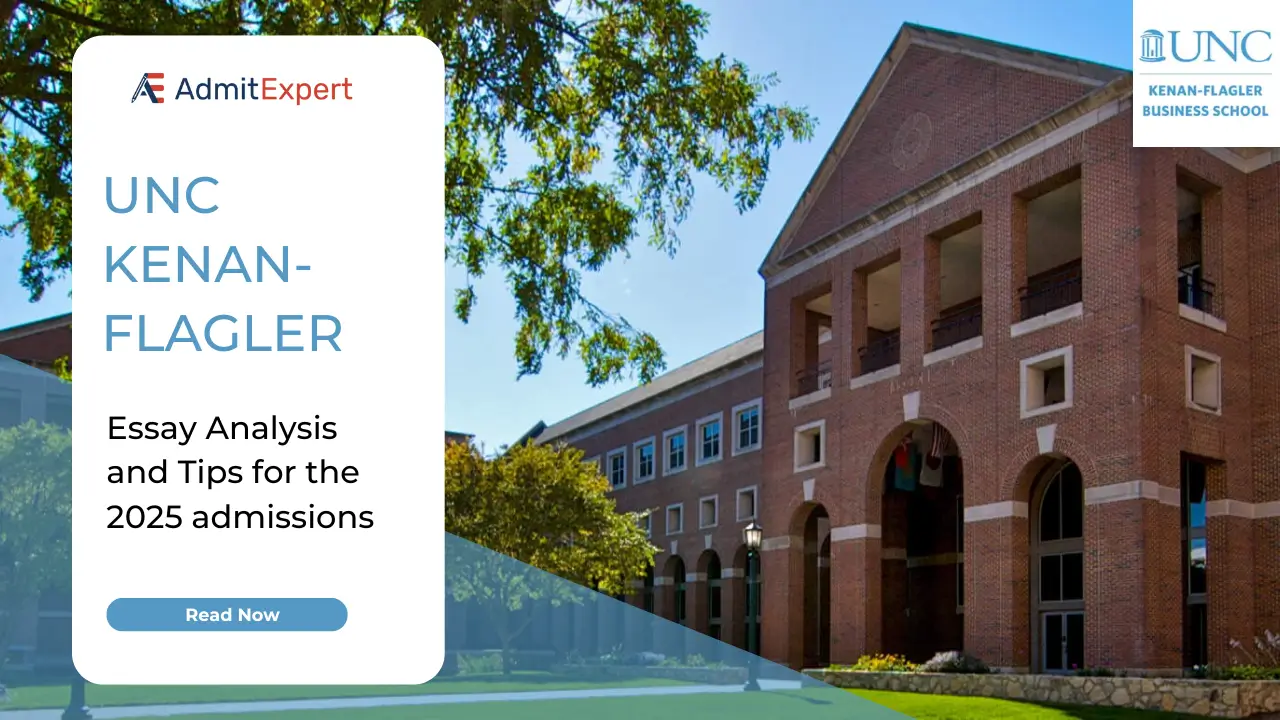
2024-2025 UNC Kenan Flagler MBA Essay Tips and Analysis
The UNC Kenan-Flagler MBA program is known for developing future business leaders with a strong commitment to making a positive impact. For the 2025 admissions, the essay prompts are designed to help applicants showcase their career goals, leadership potential, and unique qualities. This article offers an in-depth analysis, actionable tips,
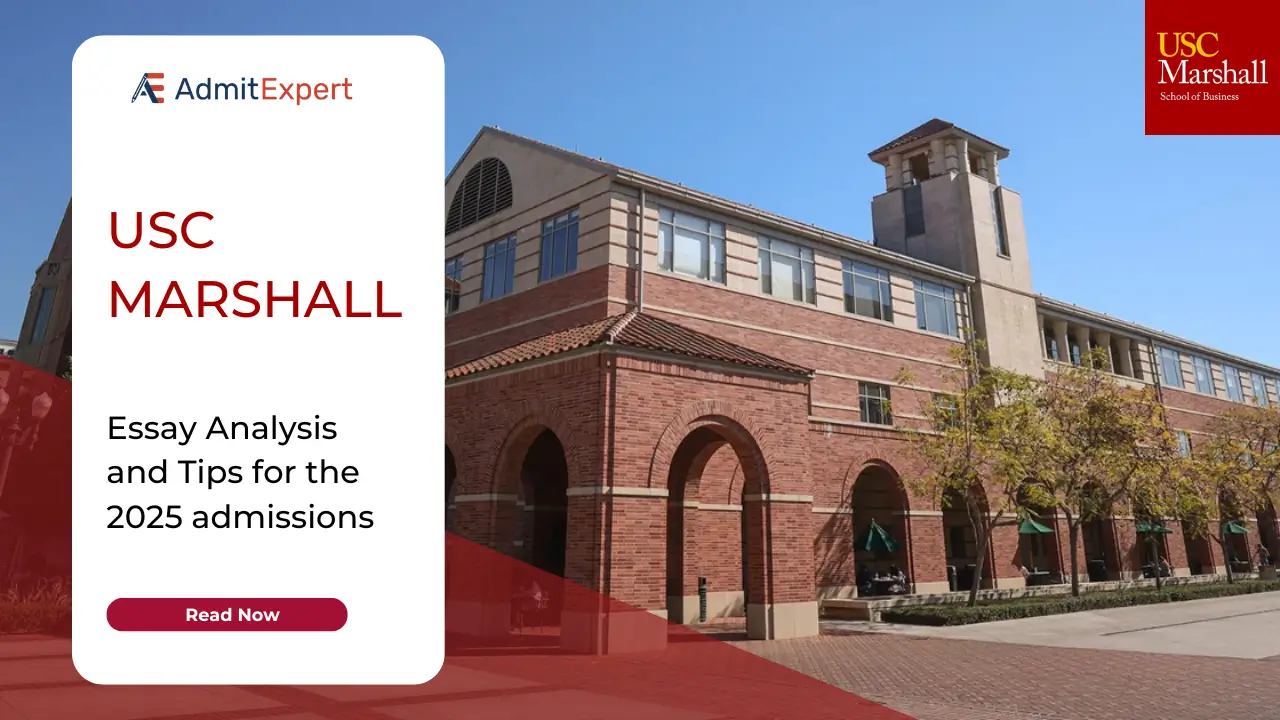
2024-2025 USC Marshall MBA Essay Tips and Analysis
The USC Marshall MBA program is known for its emphasis on innovation, collaboration, and global leadership. For the 2025 admissions cycle, applicants are tasked with presenting their career goals and personal qualities through a series of essay prompts. These prompts offer candidates the chance to demonstrate their unique perspectives, professional

2024-2025 Notre Dame Mendoza MBA Essay Tips and Analysis
When applying to the Notre Dame Mendoza MBA program, your essays are an opportunity to showcase not just your professional ambitions but also your personal qualities. The Mendoza College of Business places a strong emphasis on integrity, leadership, and a sense of purpose that aligns with their mission to create
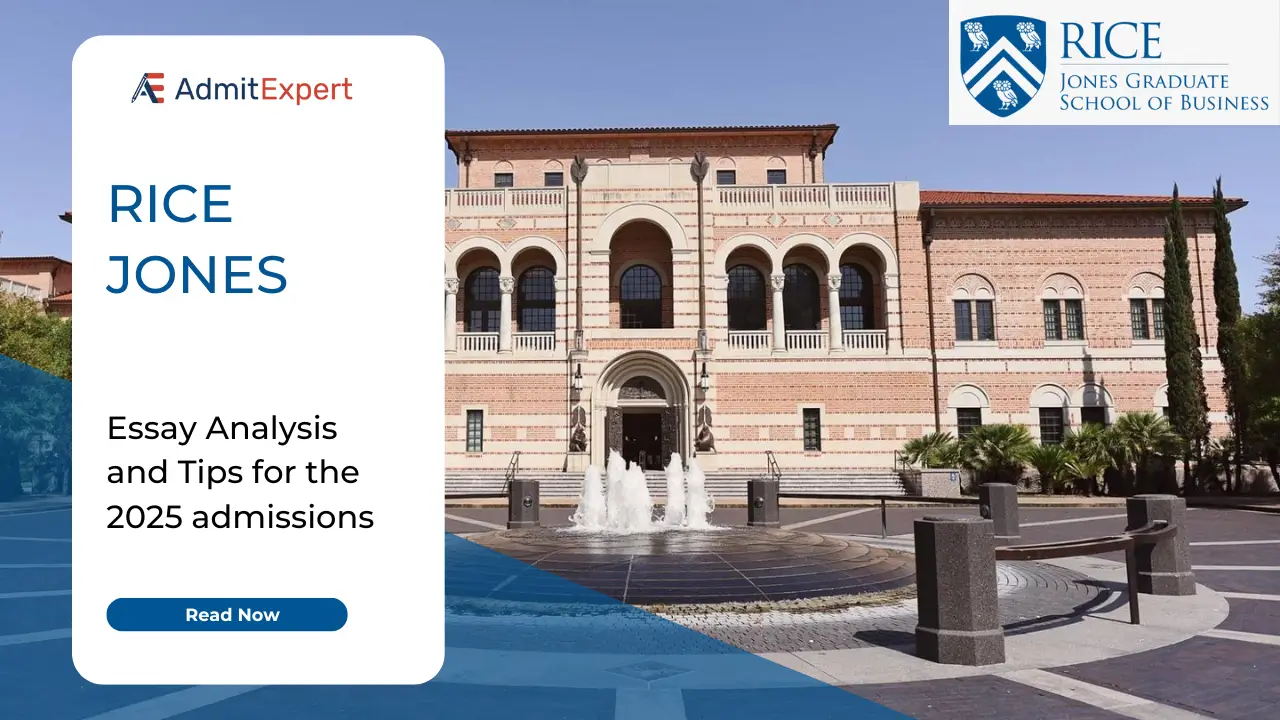
2024-2025 Rice Jones MBA Essay Tips and Analysis
Applying to the Rice Jones MBA program for the 2025 admissions cycle requires more than just submitting your resume and transcripts. The admissions committee wants to understand your career aspirations and what drives you personally. Through a set of well-crafted essay prompts, Rice Jones seeks to gain deeper insights into
We are here to assist you!
Want to get in touch with us sooner?
Send us a mail [email protected]
- Exam Prep >
- Prepare for Business School >
- Business School & Careers >
- Explore Programs >
- Connect with Schools >
- How to Apply >
- Help Center >
- About the Exam
- Register for the Exam
- Plan for Exam Day
- Prep for the Exam
- About the Executive Assessment
- Register for the Executive Assessment
- Plan for Assessment Day
- Prepare for the Assessment
- NMAT by GMAC
- Business Writing Assessment
- Shop GMAT™ Official Prep
- About GMAT™ Official Prep
- Prep Strategies
- Personalized Prep Plan
- GMAT Mini Quiz
- Executive Assessment Exam Prep
- NMAT by GMAC Exam Prep
- Business Writing Assessment Prep
Prepare For Business School
- Business Fundamentals
- Skills Insight
Business School & Careers
- Why Business School
- Student Experience
- Business Internships
- B-School Go
- Quiz: Are You Leadership Material?
- MBA Return on Investment (ROI) Calculator
- Estimate Your Salary
- Success Stories
- Diversity and Inclusion
- Women in Business
Explore Programs
- Top Business School Programs
- Quiz: Which Post Graduate Program is Right for You?
- Quiz: Find the Best Program for Your Personality
- Business School Rankings
- Business Master's Programs
- MBA Programs
- Study Destinations
- Find Programs Near Me
- Find MBA Programs
- Find Master's Programs
- Find Executive Programs
- Find Online Programs
Connect with Schools
- About GradSelect
- Create a GradSelect Profile
- Prep Yourself for B-School
- Quiz: Can You Network Like An MBA?
- Events Calendar
- School Events
- GMAC Tours Events
- In-Person Events
- Online Events
How to Apply
- Apply to Programs
- The Value of Assessments
- Admissions Essays
- Letters of Recommendation
- Admissions Interviews
- Scholarships and Financing
- Quiz: What's Your Ideal Learning Style?
Help Center
- Create Account
- How To Apply
Top Five Tips for Writing Compelling MBA Admissions Essays

Erin Wand - Personal MBA Coach
Erin Wand is an mba.com Featured Contributor and the Vice President of Marketing and Operations for Personal MBA Coach , a boutique MBA admissions consulting and tutoring firm.

For many of the business school applicants I work with, the MBA admissions essay is the part of the application they dread the most.
Does that sound like you? It doesn’t have to be! If you’re unsure about how to start on your MBA admissions essays, don’t worry. This is your opportunity to move beyond your GMAT exam scores , GPA, or resume and reveal something deeper about yourself to the admissions committee. Read along for my best MBA admission essay tips.
Crafting winning MBA admissions essays
The question is: how to you write MBA admissions essays for top-tier programs that stand out from the stack and effectively tell your story? Here are five tips for compelling essays that will stick in the minds of the admissions committee and help you get into your top choice business school program.
1. Stay focused and answer the question asked
It’s surprising how often candidates write beautiful essays but do not answer the question. While I certainly endorse thinking outside of the box and considering the “why” behind an essay prompt, first and foremost you must answer the question.
Business school applicants like you are often highly accomplished, and it can be tempting to try to include as many of the details of your accomplishments as possible into your essays. It’s crucial that you avoid this urge and focus on the specific question at hand.
2. Less can be more: be succinct
A trend I’m seeing at many leading full-time MBA programs is shorter essay word limits. Michigan Ross , Stanford GSB , UCLA Anderson , and Duke Fuqua are just a few of the programs that have reduced their essay word counts in recent admissions cycles. This trend underscores a key piece of advice: be succinct!
Remember, your essays and short answers are just one part of your application. In addition to the details you’ll provide on the application form itself, you’ll also submit an MBA resume ( check out my resume tips here! ). This allows admissions committee members ample opportunity to read about everything you have accomplished, all the roles you have held, and the awards you have won. There is no need to fit every detail into your essays.
Instead of squeezing in as much as you can, focus on sharing a few key highlights, peppering in some interesting details, and convey your authentic voice through your writing. This is your chance to explain your choices, show your accomplishments, and share your passions. The fewer things you try to cover in your essays, the more you will be able to achieve this objective.
3. Be authentic, not what you think schools want to hear
I can’t emphasize this enough: do not write what you think admissions committee members want to read! The qualities and experiences that make you unique are your greatest selling points. Each essay should paint a clear picture of who you are, what motivates you, and what you’re passionate about.
Related to this, don’t feel compelled to show how you fit the mold that seemingly makes up the “ideal” candidate. If you have no desire to run a non-profit, that’s okay! If you’re not motivated to save the planet, don’t pretend you are! The admissions committee will see right through this, and you could end up doing more harm than good. Instead, focus your energy on simply being authentic.
4. Keep your language approachable and focus on the “so what?”
The terms you regularly use at the office may be foreign to others, including admissions committee members. When in doubt, do not assume the reader is familiar with everything about your job. Admissions directors come from all backgrounds and fields and are not assigned to candidates with similar backgrounds. They do not know the ins and outs of your industry and do not need to. In fact, details and accomplishments that are significant only to someone in your industry are less compelling than understandable results and transferable skills.
Everyone from your grandmother to a professor of microfinance should be able to understand your essays. So even if your accomplishment would be extremely impressive to another engineer or investment banker, if the reader doesn’t understand the “so what,” you’re wasting your words.
5. Limit the amount of flowery prose
Remember: You’ re not submitting your essays for a Pulitzer Prize. All you’re trying to do is tell your story. While of course you want your essays to be well-written and free of grammatical mistakes and typos, you also want them to be relatable and easy to follow. They should also convey why you are someone others would want to study with, learn from, and eventually be inspired by. That type of person is human and down to earth. Your essays should show this.
Erin Wand is an mba.com Featured Contributor and the Vice President of Marketing and Operations for Personal MBA Coach , a boutique MBA admissions consulting and tutoring firm.
Founded by a Wharton MBA and MIT Sloan graduate who sits on the Association of International Graduate Admissions Consultants Board of Directors, Personal MBA Coach has been guiding clients for 14 years and is consistently ranked #1 or #2, currently holding the #1 ranking in the US on Poets&Quants.
We help clients with all aspects of the MBA application process including early planning, GMAT/GRE/EA tutoring, application strategy, school selection, essay editing and mock interviews. Our team includes a former M7 admissions director and former M7 admissions interviewers.
Last year, our clients earned more than $6M in scholarships!

IMAGES
VIDEO
COMMENTS
An MBA application essay is a detailed write-up about your personal and professional goals and aspirations. It also explains how the MBA program will help you attain your objectives for the future. It also explains how the MBA program will help you attain your objectives for the future.
6. Submit an application full of typos and grammatical errors. A sloppy application suggests a sloppy attitude. 7. Send one school an essay intended for another—or forget to change the school name when using the same essay for several applications. Admissions committees are (understandably) insulted when they see another school's name or ...
The term MBA essay is often used interchangeably with MBA application essay or MBA admissions essay. This type of essay is submitted as part of the MBA admissions process and is usually used to provide support for other application components like transcripts, recommendation letters, standardized test scores, and resumes.
FAQs for Writing Your MBA Essay. What is the most important aspect of an MBA essay that admissions committees are looking for? The most crucial aspect of an MBA essay is authenticity. Admissions committees want to see the real you, so be honest and genuine in your responses. Highlight your unique experiences, values, and aspirations to stand out.
5 Tips for Writing a Successful MBA Admissions Essay 1) Answer the Essay Question. This seems like a no-brainer, but many candidates write beautiful essays that do not answer the essay question. Instead of writing what you want to show off, answer the question (or make sure that what you want to show off answers the question!).
You can use the MBA application essay to showcase how you've grown personally and achieved your goals. #4: Your Plan. Some MBA application essay prompts will ask you about your career goals and how attendance at a particular business school will help you to achieve them. Let's look at one from the USC Marshall School of Business.
Mistakes to Avoid While Writing Your MBA Essay. In addition to following the steps for writing a great MBA essay outlined above, there are also some common mistakes you'll want to avoid while writing your essay. These mistakes are listed below, along with solutions to fix them. 1. Submitting an Overly Complex Essay
Unlock the expert tips for crafting impeccable MBA essays. Explore the significance of these essays, revealing your personality and motivation. Learn about the various essay types, from 'Why MBA' to 'Leadership' and 'Community Contribution.' Follow our step-by-step guide to create standout B-School essays, and discover valuable tips to tackle the 'Why' MBA questions. Don't miss the 10 common ...
Instead of writing what you think admissions committee members want to hear, answer the question. What are the most common MBA essay questions? While there are countless different essay questions across MBA programs, the three most common types of essays questions are Goals Essays, Why an MBA? Essays, and Personal Story Essays.
The question is: how to you write MBA admissions essays for top-tier programs that stand out from the stack and effectively tell your story? Here are five tips for compelling essays that will stick in the minds of the admissions committee and help you get into your top choice business school program. 1. Stay focused and answer the question asked